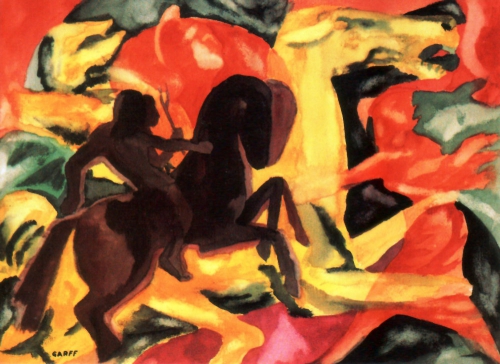
"Polemos", par Enrico Garff
Conversation avec Julien Freund
par Pierre Bérard
Ex: http://asymetria-anticariat.blogspot.com
 Julien Freund est mort en septembre 1993. De la fin des années 70 jusqu'à son décès, je l'ai rencontré à maintes reprises tant à Strasbourg que chez lui à Villé et dans ces villes d'Europe où nous réunissaient colloques et conférences. Des heures durant j'ai frotté à sa patience et à sa perspicacité les grands thèmes de la Nouvelle Droite. Il les accueillait souvent avec une complicité rieuse, parfois avec scepticisme, toujours avec la franche indépendance d'esprit qui a marqué toute son existence. Les lignes qui suivent mettent en scène des conversations tenues à la fin des années quatre-vingt. Des notes prises alors sur le vif et des souvenirs demeurés fort intenses m'ont permis de reconstituer par bribe certains de ces moments. Bien entendu, il ne s'agit pas d'utiliser ici le biais de la fiction posthume pour prêter à Julien Freund des propos que les calomniateurs dont on connaît l'acharnement pourraient instrumenter contre la mémoire d'un grand maître. C'est pourquoi j'entends assumer l'entière responsabilité de ce dialogue. Lors de ces entrevues, on le devine, l'ami absent mais souvent évoqué était Alain de Benoist. Ce texte lui est dédié.
Julien Freund est mort en septembre 1993. De la fin des années 70 jusqu'à son décès, je l'ai rencontré à maintes reprises tant à Strasbourg que chez lui à Villé et dans ces villes d'Europe où nous réunissaient colloques et conférences. Des heures durant j'ai frotté à sa patience et à sa perspicacité les grands thèmes de la Nouvelle Droite. Il les accueillait souvent avec une complicité rieuse, parfois avec scepticisme, toujours avec la franche indépendance d'esprit qui a marqué toute son existence. Les lignes qui suivent mettent en scène des conversations tenues à la fin des années quatre-vingt. Des notes prises alors sur le vif et des souvenirs demeurés fort intenses m'ont permis de reconstituer par bribe certains de ces moments. Bien entendu, il ne s'agit pas d'utiliser ici le biais de la fiction posthume pour prêter à Julien Freund des propos que les calomniateurs dont on connaît l'acharnement pourraient instrumenter contre la mémoire d'un grand maître. C'est pourquoi j'entends assumer l'entière responsabilité de ce dialogue. Lors de ces entrevues, on le devine, l'ami absent mais souvent évoqué était Alain de Benoist. Ce texte lui est dédié.
J.F. - Vous êtes à l'heure, c'est bien !
Visage plein, barré d'un large sourire, Julien Freund se tient sur le pas de sa porte.
- J'ai réservé à l'endroit habituel, poursuit-il.
Il enfile un anorak, ajuste un béret sur une brosse impeccable et se saisit de sa canne. Regard amusé sur la gîte inquiétante de la voiture que je viens de garer cahin caha sur l'accotement boueux qui jouxte le chemin de terre. Nous descendons en direction du bourg de Villé.
J.F. - Comment va votre ami Alain de Benoist ?
Puis, tout de go, sans même attendre la réponse :
- Comme vous, je suis frappé par l'aboulie de l'Europe. Regardez, les élèves alsaciens choisissent de moins en moins l'allemand à l'école ! Plus l'Europe se construit par une sorte d'engrenage et moins les Européens s'intéressent les uns aux autres. Dans tous les pays de la Communauté, l'enseignement des autres langues européennes régresse au bénéfice de l'anglais. Par dévolution, elle hérite des patries sans réussir à se doter de leurs qualités. Elle fonctionne comme une procédure de dépolitisation. Elle ne veut pas s'assigner de limites géographiques. Elle ne veut pas être un territoire. Un territoire, voyez-vous, ce n'est pas un espace neutre, susceptible d'une dilatation à l'infini. Le territoire est à l'opposé de l'espace abstrait, c'est un site conditionné, habité par une culture. La nouvelle frontière utopique de l'Europe, c'est l'impolitique des droits de l'homme. C'est une notion hyperbolique mais vague... on ne meurt pas pour une notion aussi floue. Cet espace là n'a pas de qualité, pas d'épaisseur, pas de densité. Il ne peut pas susciter l'adhésion. Seul le territoire peut nourrir des liens d'affection, d'attachement. Du fait du particularisme qui lui est inhérent, l'identité collective exige des frontières. Elle entre en crise quand toute démarcation s'efface. Etre Européen, c'est être dépositaire d'un patrimoine spécifique et s'en reconnaître comptable.
Je croyais ardemment à la construction européenne, mais je suis devenu sceptique dans la mesure où cette Europe là risque bien de n'être qu'un vecteur de la dénationalisation générale, la simple conjugaison de nos impuissances. L'Europe semble vouloir expier son ancienne volonté de puissance. Nous sommes au balcon de l'histoire, et nous faisons étalage de nos bons sentiments.
Il suffit de considérer la complaisance avec laquelle nous nous laissons culpabiliser. Comment s'appelle ce monsieur qui a sorti un livre là-dessus ?
P.B. - Pascal Bruckner... " Le sanglot de l'homme blanc "
J.F. - L'avez-vous lu ?
P.B. - Bien sûr... mais si il fustige en effet la mauvaise conscience européenne, c'est au nom des valeurs universelles de l'Occident dont se réclament aussi les Père-Fouettards qui charcutent notre passé afin de le maudire. Les uns et les autres raisonnent à partir des mêmes présupposés. Bruckner est le héraut d'un universalisme fier et conquérant qui, dans le sillage du néo-libéralisme entend imposer le magistère moral de l'Occident à l'ensemble de l'oekoumène. Ce qu'il reproche aux larmoyants, c'est de n'instrumenter les mêmes valeurs que pour nous diminuer. Ce que disent en revanche les détracteurs de l'Europe, c'est que jamais nous ne fûmes dignes de notre mission civilisatrice. A ce gémissement, Bruckner rétorque qu'il nous faut être forts dans le seul but de sermonner le monde et de lui apprendre les bonnes manières...
J.F. - C'est aux antipodes de ce qu'écrit Alain de Benoist dans son livre sur le tiers monde.
P.B. - En effet ; lui a d'autres paradigmes. Il se tient plutôt dans le camp de l'anthropologie culturelle. Du côté du relativisme.
J.F. - Il n'a pas tort d'un point de vue ontologique, car il faut se débarrasser des excès de l'ethnocentrisme, surtout quand il entretient l'exorbitante prétention de se prétendre universel. Mais politiquement il fait fausse route.
P.B. - Et pourquoi ça ?
J.F. - Relisez mon Essence du politique. Si le tiers monde nous désigne comme ennemi ; par exemple en tant qu'ancienne puissance coloniale responsable de tous ses échecs ; alors nous ne pouvons pas nous dérober sous peine de capitulation. L'affrontement politique n'est pas suspendu aux choix des valeurs, mon cher ami...
Julien Freund fait mine de se renfrogner, puis il éclate de rire...Il fouille le menu avec gourmandise.
J.F. - Qu'est-ce que nous avions pris la dernière fois ?
P.B. - Un baeckeofe.
J.F. - je propose donc un jambonneau et comme il n'y a pas de rouge d'Ottrott, nous allons nous rabattre sur un pinot noir...Sur cet universalisme fallacieux qui règne depuis la dernière guerre mondiale, Schmitt s'est exprimé dans les années vingt. Il écrit dans sa Notion de Politique que " le concept d'humanité est un instrument idéologique particulièrement utile aux expansions impérialistes " et que " sous sa forme éthique et humanitaire, il est un véhicule spécifique de l'impérialisme économique ". Bien évidemment les Américains traduisent leurs intérêts nationaux en langage internationaliste, exactement comme le font les Soviétiques. Mais vous le savez bien, si j'accepte de comparer ces deux puissances, ce n'est pas pour les confondre. Cependant, si le despotisme communiste venait à disparaître comme pourraient le laisser prévoir tous ces craquements à l'Est, l'Amérique pourrait être tentée par une hégémonie sans retenue.
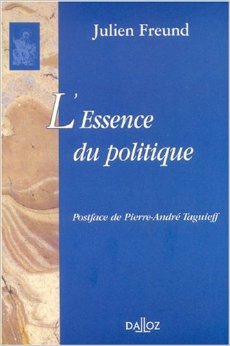 En réponse à ces immenses défis, je suis frappé par le caractère routinier du débat européen. L'Europe se construit d'une manière fonctionnaliste, par une suite d'enchaînements automatiques. Son fétichisme institutionnel permet de dissimuler notre maladie qui est l'absence d'objectifs affichés. Nous sommes par exemple impuissants à nous situer par rapport au monde. Etrange narcissisme ; on se congratule d'exister, mais on ne sait ni se définir, ni se circonscrire. L'Europe est-elle reliée à un héritage spécifique ou bien se conçoit-elle comme une pure idéalité universelle, un marchepied vers l'Etat mondial ? L'énigme demeure avec un penchant de plus en plus affirmé pour la seconde solution qui équivaudrait à une dissolution. Ce processus se nourrit par ailleurs, c'est transparent chez les Allemands, d'une propension à fuir le passé national et se racheter dans un sujet politique plus digne d'estime, une politie immaculée, sans contact avec les souillures de l'histoire. Cette quête de l'innocence, cet idéalisme pénitentiel qui caractérisent notre époque se renforcent au rythme que lui imposent les progrès de cette mémoire négative toute chargée des fautes du passé national. On veut lustrer une Europe nouvelle par les vertus de l'amnésie. Par le baptême du droit on veut faire un nouveau sujet. Mais ce sujet off-shore n'est ni historique, ni politique. Autant dire qu'il n'est rien d'autre qu'une dangereuse illusion. En soldant son passé, l'Europe s'adosse bien davantage à des négations qu'à des fondations. Conçue sur cette base, l'Europe ne peut avoir ni objectif, ni ambition et surtout elle ne peut plus rallier que des consentements velléitaires. Le nouvel Européen qu'on nous fabrique est une baudruche aux semelles de vent. Les identités fluides, éphémères qu'analyse Michel Maffesoli ne peuvent en aucun cas tenir le rôle des identités héritées. Elles n'agrègent que de manière ponctuelle et transitoire, en fonction de modes passagères. Oui, ce ne sont que des agrégats instables stimulés par le discours publicitaire. L'orgiasme n'est pas une réponse au retrait du politique, car il exclut la présence de l'ennemi. Quand il se manifeste, l'ennemi, lui, ne s'adonne pas au ludisme dionysiaque. Si le politique baisse la garde, il y aura toujours un ennemi pour troubler notre sommeil et déranger nos rêves. Il n'y a qu'un pas de la fête à la défaite. Ces tribus là ne sont pas un défi à l'individualisme, elles en sont l'accomplissement chamarré...
En réponse à ces immenses défis, je suis frappé par le caractère routinier du débat européen. L'Europe se construit d'une manière fonctionnaliste, par une suite d'enchaînements automatiques. Son fétichisme institutionnel permet de dissimuler notre maladie qui est l'absence d'objectifs affichés. Nous sommes par exemple impuissants à nous situer par rapport au monde. Etrange narcissisme ; on se congratule d'exister, mais on ne sait ni se définir, ni se circonscrire. L'Europe est-elle reliée à un héritage spécifique ou bien se conçoit-elle comme une pure idéalité universelle, un marchepied vers l'Etat mondial ? L'énigme demeure avec un penchant de plus en plus affirmé pour la seconde solution qui équivaudrait à une dissolution. Ce processus se nourrit par ailleurs, c'est transparent chez les Allemands, d'une propension à fuir le passé national et se racheter dans un sujet politique plus digne d'estime, une politie immaculée, sans contact avec les souillures de l'histoire. Cette quête de l'innocence, cet idéalisme pénitentiel qui caractérisent notre époque se renforcent au rythme que lui imposent les progrès de cette mémoire négative toute chargée des fautes du passé national. On veut lustrer une Europe nouvelle par les vertus de l'amnésie. Par le baptême du droit on veut faire un nouveau sujet. Mais ce sujet off-shore n'est ni historique, ni politique. Autant dire qu'il n'est rien d'autre qu'une dangereuse illusion. En soldant son passé, l'Europe s'adosse bien davantage à des négations qu'à des fondations. Conçue sur cette base, l'Europe ne peut avoir ni objectif, ni ambition et surtout elle ne peut plus rallier que des consentements velléitaires. Le nouvel Européen qu'on nous fabrique est une baudruche aux semelles de vent. Les identités fluides, éphémères qu'analyse Michel Maffesoli ne peuvent en aucun cas tenir le rôle des identités héritées. Elles n'agrègent que de manière ponctuelle et transitoire, en fonction de modes passagères. Oui, ce ne sont que des agrégats instables stimulés par le discours publicitaire. L'orgiasme n'est pas une réponse au retrait du politique, car il exclut la présence de l'ennemi. Quand il se manifeste, l'ennemi, lui, ne s'adonne pas au ludisme dionysiaque. Si le politique baisse la garde, il y aura toujours un ennemi pour troubler notre sommeil et déranger nos rêves. Il n'y a qu'un pas de la fête à la défaite. Ces tribus là ne sont pas un défi à l'individualisme, elles en sont l'accomplissement chamarré...
Et puis, c'est une Europe de la sempiternelle discussion ... et toujours sur des bases économiques et juridiques, comme si l'économie et le droit pouvaient être fondateurs. Vous savez l'importance que j'accorde à la décision, or l'Europe est dirigée par une classe discutante qui sacrifie le destin à la procédure dans un interminable bavardage qui ne parvient guère à surmonter de légitimes différents. Ce refus de la décision est lié au mal qui frappe nos élites ; elles ne croient plus à la grandeur de notre continent ; elles sont gâtées jusqu'à la moelle par la culpabilité dont elles transmettent l'agent létal à l'ensemble des Européens. D'où cette dérive moralisatrice qui transforme l'Europe en tribunal, mais en tribunal impuissant.
P.B. - Il n'est pas toujours impuissant à l'égard des autochtones...
J.F. - Ca, c'est une autre affaire... Impuissant, car nous prétendons régir la marche du monde vers l'équité, mais nous refusons d'armer le bras de cette prétendue justice. La culpabilité névrotique inhibe l'action.Le problème, c'est que l'Europe est construite par des libéraux et par des socio-démocrates, c'est à dire par des gens qui croient dans l'économie comme instance déterminante. C'est pourquoi la neutralisation du politique est pour ainsi dire inscrite dans son code génétique.
P.B. - L'Europe n'est qu'un tigre de papier.
J.F. - Elle ne fait même pas semblant d'être un tigre ! Depuis plus de quarante ans, elle s'en remet aux Américains pour ce qui est de sa protection. Elle a pris le pli de la vassalité, l'habitude d'une servitude confortable. C'est ce que dévoilent d'ailleurs les choix budgétaires de tous ses gouvernements quelle qu'en soit la couleur : la portion congrue pour la défense, une part grandissante pour les dépenses sociales. En réalité, L'Europe ne peut se construire que sur un enjeu ultime... la question de la vie et de la mort. Seul le militaire est fédérateur, car dans l'extrême danger il est la seule réponse possible. Or ce danger viendra, car l'Europe vieillissante riche et apathique ne manquera pas d'attiser des convoitises. Alors viendra le moment de la décision, celui de la reconnaissance de l'ennemi... Ce sera le sursaut ou la mort. Voilà ce que je pense. M'exprimer de cette manière ne me vaut pas que des amis...
P.B. - Maints ennemis, beaucoup d'honneur...
Julien Freund n'est pas en odeur de sainteté. Des clercs de seconde zone ourdissent à son encontre une campagne de sous-entendus. Ces calomnies reviennent souvent, dans nos ultimes conversations. Pourquoi un tel acharnement ?
J.F. - J'ai cultivé l'indépendance d'esprit, ce qui fait de moi un suspect dans un milieu universitaire de plus en plus contaminé par le conformisme moralisant. Et puis, avec le soutien de Raymond Aron, j'ai introduit en France l'oeuvre de Carl Schmitt.
P.B. - Est-ce que cela suffit à vous frapper d'un anathème sournois ?
J.F. - Et comment ! Schmitt, c'est le démenti des niaiseries contemporaines en matière de philosophie politique. J'ai intronisé le loup ; c'est la panique dans la bergerie de Panurge. La gauche morale est anémique. Elle est déstabilisée par un tel monument. Vous comprenez... C'est une pensée très construite et qui rassemble les plus grandes oeuvres du canon occidental. Ils ne peuvent pas s'en débarrasser d'une pichenette...
 P.B. - Alors comme souvent, quand l'omerta n'est plus tenable, ils déblatèrent.
P.B. - Alors comme souvent, quand l'omerta n'est plus tenable, ils déblatèrent.
J.F. - En France, oui, c'est l'invective. Pas en Italie, pas en Espagne. En France, on refuse d'être déniaisé ; on préfère la calomnie venimeuse et les coups de clairon antifascistes. " Schmitt - nazi " ! C'est toujours la même rengaine. Auparavant, les intellectuels libéraux discutaient avec Schmitt. Aron bien sûr, mais regardez Léo Strauss aux Etats-Unis ou Jacob Taubes. Même Walter Benjamin a reconnu sa dette. Ceux d'aujourd'hui subissent l'ascendant de leurs adversaires de gauche et tentent par tous les moyens de s'innocenter. Ils sont les victimes consentantes de la stratégie du soupçon... par lâcheté. Quant à la gauche... depuis que Mitterrand a renoncé à la rupture avec le capitalisme, elle s'est réfugié dans la politique morale ; elle ne pense plus qu'en terme d'antifascisme. La lutte des " places " a remplacé la lutte des classes. " Schmitt-nazi " ; alors on susurre que Freund, c'est du pareil au même.
P.B. - D'autant que vous avez aggravé votre cas...
J.F. - Oui, en vous fréquentant ! J'ai dit publiquement l'intérêt que je portais au travail d'Alain de Benoist. C'est le coup de grâce. Après ça, il n'y a plus de rémission. Je mérite la proscription...
Julien Freund déchaîne un rire espiègle et commande une nouvelle bouteille de pinot noir.
... Ici, certains n'ont pas digéré le débat que j'arbitrais et qui vous avait opposé à eux, Faye et vous, au palais universitaire. Ce fut leur déconfiture... Une Berezina dont ils me tiennent toujours rigueur. Vous comprenez leur exaspération. Ils sont habitués à ressasser leurs mantras sans qu'aucun adversaire à la hauteur ne vienne déranger la litanie et puis là, face au diable, ce qui ne devrait jamais arriver... ce face à face c'est l'interdit majeur. Là donc ils s'effondrent. Et leurs propres étudiants vous applaudissent réduisant leur claque au silence. C'est que... ils se sont enlisés dans la paresse argumentative ; ils ronronnent sans que le moindre désaveu un peu farouche leur soit opposé. Quant aux grands professeurs qui pourraient les contrer, ils existent toujours, mais ils sont tétanisés. La plupart se sont réfugiés dans la pure érudition et songent d'abord à ménager leur carrière... Ils ont déserté l'espace public.Tenez, savez-vous qu'il est question de traduire en espagnol l'ouvrage collectif que j'avais dirigé avec André Béjin sur le racisme ?
P.B. - Le racisme et l'antiracisme... Il y a quelques années le racisme seul suscitait interrogation et condamnation. L'antiracisme allait de soi ; c'était la réponse légitime à la vilenie.
J.F. - Oui, il devient urgent non seulement d'interroger l'antiracisme, mais de le faire parler. La révérence pieuse qui entoure ce prêchi-prêcha est devenue insupportable !
P.B. - Il y a une hésitation de la doxa antiraciste. L'Autre doit-il être envisagé comme le semblable ou comme le différent ?
J.F. - Mais, Bérard, ce n'est pas une hésitation, mais une confusion ! La vulgate antiraciste, c'est un alliage d'insuffisance théorique et d'arrogance rhétorique. Et en prime, l'alibi d'une morale incontestable.
P.B. - Soit. La substance de l'antiracisme est mouvante parce qu'elle est surdéterminée par des manigances tactiques, tantôt assimilationniste sur le mode républicain, tantôt différentialiste dans une perspective qu'on pourrait dire... américaine...
J.F. - Ce sont ces errements qui le rendent difficile à saisir. Je ne suis pas persuadé qu'ils soient seulement tactiques. D'ailleurs les deux discours fonctionnent côte à côte dans un agrégat extravagant de paralogismes. Mais de leur point de vue ça n'a pas d'importance. Ce qui compte, c'est la posture morale. La pureté des intentions est censée cautionner l'échafaudage intellectuel, comme dans le pacifisme. Vous connaissez mes travaux là-dessus.
P.B. - La confusion est renforcée par la polysémie du vocabulaire.
J.F. - Bien sûr. Qu'est-ce qu'une race ? Est-ce une notion scientifique ? Est-ce un pur flatus vocis forgé par l'idéologie ? L'aspect plurivoque de toutes ces choses qu'on ne veut surtout pas définir de façon rigoureuse donne licence aux discours des charlatans. Il y a un dévergondage propre au dégoisement antiraciste. Il manie des idées confuses pour mieux pêcher en eau trouble et intoxiquer les esprits. D'autant que ce galimatias est secondé par la presse qui maintient une pression constante sur l'opinion en interprétant à sa manière le moindre fait divers. Gare aux incartades... Je ne parviens plus à lire Le Monde...
P.B. - J'en reviens quand même à ce que je disais. Il y a donc l'obligation morale d'aimer l'Autre et de l'admettre dans la communauté politique comme un semblable. Par ailleurs, enfin adoubé comme alter ego, il conviendra sans doute de le pourvoir de privilèges compensatoires justifiés par les souffrances que la xénophobie et le racisme lui feraient endurer. C'est la querelle de la discrimination positive qui commence à poindre en plein pathos républicain...
J.F. - L'américanisation comme dit Alain de Benoist.
P.B. - Et, en même temps qu'il se voit invité à entrer dans la maison commune...
J.F. - C'est un spectre, un épouvantail que la gauche agite pour renforcer le vote protestataire.
P.B. - ...Sa promotion de commensal particulièrement choyé à la table citoyenne s'accompagne de la fabrication d'un Autre absolu qu'il est recommandé d'exclure, voire de haïr. Cet Autre brutalement retranché du genre humain, c'est, bien entendu le raciste, le xénophobe... ou, du moins, celui auquel il est avantageux de coller cette étiquette. Ainsi se vérifie cette constante sociologique qui exige que le Nous se construise sur l'exclusion d'un Autre. Et, le paradoxe, c'est que ceux qui font profession de pourfendre l'exclusion sont les premiers à illustrer la permanence de ce principe !
J.F. - Ah... Ce n'est pas un paradoxe, mais comme vous le dites, une vérification, une vérification ironique...
Julien Freund s'esclaffe, longuement, puis se racle la gorge avant de poursuivre.
- ...Ceux qui sont visés, ce sont évidemment les gens d'extrême droite dans la mesure où ils entendent s'affirmer comme des compétiteurs dans le jeu démocratique... mais il se pourrait qu'à l'avenir des strates entières du petit peuple autochtone soient pour ainsi dire la proie de cette exclusion rageuse. En attribuant le racisme aux seuls Européens, l'antiracisme donne de plus en plus l'impression de protéger unilatéralement une partie de la population contre l'autre. Or, en abdiquant le révolutionnarisme lyrique au profit du capitalisme libéral, Mitterrand sacrifie cette clientèle de petites gens bercée jusqu'ici par le discours égalitariste. Vous comprenez, ils ont été habitués à une vision irénique de l'avenir. Et justement, ce sont eux les plus concernés dans leur vie quotidienne, les plus exposés à la présence étrangère. On sait, depuis Aristote, que l'étranger a toujours été un élément conflictuel dans toutes les sociétés. L'harmonie dans une société... disons " multiraciale " est, plus que dans toute autre, une vue de l'esprit. Or, ces gens dont nous parlons, ceux du bistrot, ici, ceux que je rencontre tous les jours à Villé, ils ne participent pas de la civilité bourgeoise. Ils ne subliment pas leurs affects. Leurs réactions sont plus spontanées, leur jactance moins étudiée. Affranchis des règles de la bienséance hypocrite, ils seront les premières victimes des censeurs de cet antiracisme frelaté qui rêve de placer la société sous surveillance. Traquenards, chausse-trapes, procédés de basse police, délations... ce sont ces malheureux qui seront bientôt les victimes de ce climat d'intolérance. L'empire du Bien est un empire policier ou l'on traque le faux-pas, le lapsus, le non-dit et même l'humour...
P.B. - Ils apprendront à se taire, à dissimuler...
J.F. - Ah, mon cher, je suis fils d'ouvrier et je vis dans un village... Ils ne se tairont pas. Il se peut qu'à force on fasse de ces braves gens des bêtes fauves... C'est ma crainte, je l'avoue... D'autant que les soi-disantes autorités morales cherchent à expier notre passé colonial en accoutrant l'immigré africain de probité candide et de lin blanc...
P.B. - C'est la version post-moderne du bon sauvage... que la méchanceté de notre passé doterait d'une créance inépuisable.
J.F. - Ah oui, cette histoire de la dette... c'est un thème sartrien. Mais c'est d'abord une victime qui doit pouvoir bénéficier de certaines immunités. En effet. De pareils privilèges, même symboliques - mais dans une société matérialiste les privilèges ne se contentent pas de demeurer symboliques - ne peuvent que renforcer les antagonismes et puis, surtout, comprenez bien ça, cela heurte l'évangile égalitaire dont les Français ont la tête farcie. En jouant simultanément l'antiracisme et Le Pen contre la droite, Mitterrand va provoquer la sécession de la plèbe. Cela paraît habile... Mitterrand le Florentin et que sais-je encore... mais c'est impolitique. Car, le politique doit toujours envisager le pire pour tenter de le prévenir. J'insiste : si l'étranger est reconnu comme un élément de désorganisation du consensus, il éveille un sentiment d'hostilité et de rejet. Un brassage de population qui juxtapose des origines aussi hétérogènes ne peut que susciter des turbulences qu'il sera difficile de maîtriser.
P.B. - Les rédempteurs de l'humanité sont indécrottables ?
J.F. - Les sentinelles de l'antifascisme sont la maladie de l'Europe décadente. Ils me font penser à cette phrase de Rousseau persiflant les cosmopolites, ces amoureux du genre humain qui ignorent ou détestent leurs voisins de palier. La passion trépidante de l'humanité et le mépris des gens sont le terreau des persécutions à venir. Votre ami Alain de Benoist a commencé d'écrire de bonnes choses là-dessus. Dites-le-lui, il faut aller dans ce sens : la contrition pathologique de nos élites brouille ce qui fut la clé du génie européen ; cette capacité à se mettre toujours en question, à décentrer le jugement. Ceux qui nous fabriquent une mémoire d'oppresseurs sont en fait des narcissiques. Ils n'ont qu'un souci : fortifier leur image de pénitents sublimes et de justiciers infaillibles en badigeonnant l'histoire de l'Europe aux couleurs de l'abjection. Regardez ce qu'écrit Bernard-Henri Lévy sur Emmanuel Mounier... C'est un analphabète malfaisant. En 1942, j'étais avec Mounier à Lyon... en prison ! En épousant l'universel, ils s'exhaussent du lot commun ; ils se constituent en aristocratie du Bien... L'universel devient la nouvelle légitimité de l'oligarchie !
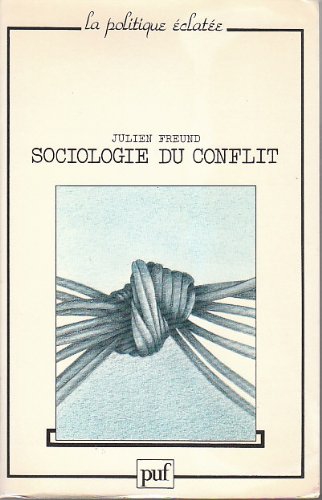 P.B. - C'est Nietzsche qui écrit dans La volonté de puissance que l'Europe malade trouve un soulagement dans la calomnie. Mais il se pourrait bien que le masochisme européen ne soit qu'une ruse de l'orgueil occidental. Blâmer sa propre histoire, fustiger son identité, c'est encore affirmer sa supériorité dans le Bien. Jadis l'occidental assurait sa superbe au nom de son dieu ou au nom du progrès. Aujourd'hui il veut faire honte aux autres de leur fermeture, de leur intégrisme, de leur enracinement coupable et il exhibe sa contrition insolente comme preuve de sa bonne foi. Ce ne serait pas seulement la fatigue d'être soi que trahirait ce nihilisme contempteur mais plus certainement la volonté de demeurer le précepteur de l'humanité en payant d'abord de sa personne. Demeurer toujours exemplaire, s'affirmer comme l'unique producteur des normes, tel est son atavisme. Cette mélodie du métissage qu'il entonne incessamment, ce ne serait pas tant une complainte exténuée qu'un péan héroïque. La preuve ultime de sa supériorité quand, en effet, partout ailleurs, les autres érigent des barrières et renforcent les clôtures. L'occidental, lui, s'ouvre, se mélange, s'hybride dans l'euphorie et en tire l'argument de son règne sur ceux qui restent rivés à l'idolâtrie des origines. Ce ne serait ni par abnégation, ni même par résignation qu'il précipiterait sa propre déchéance mais pour se confondre enfin intégralement avec ce concept d'humanité qui a toujours été le motif privilégié de sa domination... Il y a beaucoup de cabotinage dans cet altruisme dévergondé et dominateur et c'est pourquoi le monde du spectacle y tient le premier rôle...
P.B. - C'est Nietzsche qui écrit dans La volonté de puissance que l'Europe malade trouve un soulagement dans la calomnie. Mais il se pourrait bien que le masochisme européen ne soit qu'une ruse de l'orgueil occidental. Blâmer sa propre histoire, fustiger son identité, c'est encore affirmer sa supériorité dans le Bien. Jadis l'occidental assurait sa superbe au nom de son dieu ou au nom du progrès. Aujourd'hui il veut faire honte aux autres de leur fermeture, de leur intégrisme, de leur enracinement coupable et il exhibe sa contrition insolente comme preuve de sa bonne foi. Ce ne serait pas seulement la fatigue d'être soi que trahirait ce nihilisme contempteur mais plus certainement la volonté de demeurer le précepteur de l'humanité en payant d'abord de sa personne. Demeurer toujours exemplaire, s'affirmer comme l'unique producteur des normes, tel est son atavisme. Cette mélodie du métissage qu'il entonne incessamment, ce ne serait pas tant une complainte exténuée qu'un péan héroïque. La preuve ultime de sa supériorité quand, en effet, partout ailleurs, les autres érigent des barrières et renforcent les clôtures. L'occidental, lui, s'ouvre, se mélange, s'hybride dans l'euphorie et en tire l'argument de son règne sur ceux qui restent rivés à l'idolâtrie des origines. Ce ne serait ni par abnégation, ni même par résignation qu'il précipiterait sa propre déchéance mais pour se confondre enfin intégralement avec ce concept d'humanité qui a toujours été le motif privilégié de sa domination... Il y a beaucoup de cabotinage dans cet altruisme dévergondé et dominateur et c'est pourquoi le monde du spectacle y tient le premier rôle...
J.F. - Je ne crois pas aux facultés démonstratives de la preuve par la mort, quant aux baladins de l'humanitarisme, ces artistes dont vous parlez, mués en prédicateurs citoyens, ils me rappellent un autre aphorisme de Nietzsche qui écrivait dans Le Crépuscule des idoles que si l'on pense que la culture a une utilité, on confondra rapidement ce qui est utile avec la culture. Nous y sommes. Les histrions sont devenus les hussards noirs des temps de détresse...
P.B. - Il y a un autre paradoxe. Au-delà de leurs périphrases lénifiantes pour nier ou euphémiser les ruptures qui travaillent le corps social, les ligues de vertu semblent hypnotisées par l'ethnique et le racial, même si c'est pour le conjurer ; et ils le déversent à grands tombereaux sur une France plutôt placide qui se voit pour ainsi dire sommée de penser les rapports humains dans les catégories que l'antiracisme se donne officiellement pour mission d'abolir...
J.F. - Des écervelés... des têtes de linotte...
P.B. - Diriez-vous aussi qu'ils sont les fourriers d'une racisation démesurée des rapports sociaux ?
J.F. - Moi, je suis du côté de Barrès. Je ne suis pas l'enfant du " pluriculturel " dont on nous abreuve. Je suis né dans une tradition, sur un territoire, dans un groupe déterminé. C'est par ces liens traditionnels que j'accède à la condition humaine. Décrire cela comme une prison, c'est assigner des milliards d'humains à la condition de bagnards. Ceci étant dit... C'est comme ça que cela se passe aux Etats-Unis, non ? Là-bas il y a une congruence du social et du racial, une substantialisation des catégories sociales qui tend à enfermer certains groupes dans un déterminisme sans espoir.
P.B. - Bizarrement, cette thématique trahit chez les antiracistes de profession une sorte de refoulé...
J.F. - Bérard, ne faites pas de psychanalyse à deux sous... Mais c'est vrai qu'ils abusent d'un langage saturé de référents raciaux. Faire l'apologie du métissage, c'est comme honorer la race pure. C'est ramener l'axiologie à la pâte biologique avec, dans les deux cas, le même fantasme prométhéen, celui des ingénieurs du vivant, des biotechniciens.
P.B. - Cela me fait penser aux manuels de confession de la contre-réforme catholique. Ils sont gorgés de descriptions pornographiques. Bien sûr, là aussi c'était pour le bon motif. Mais certains travaux récents montrent que c'est par le biais du confessionnal que les pratiques anticonceptionnelles se seraient répandues dans les campagnes... l'onanisme comme effet pervers de l'interrogatoire ecclésiastique. Le sexe et la race, deux figures de l'obscénité ; tout le monde y pense, personne n'en parle...
J.F. - Ah ça, c'est du Maffesoli !
Julien Freund s'enferme dans une méditation silencieuse qu'il brise après quelques instants d'une phrase dont il hache chaque syllabe avec une componction moqueuse.
J.F. - Je - vais - prendre - un - munster !
P.B. - Je m'exprime plus clairement. Si il y a retour du refoulé, y compris sur le mode d'une dénégation rageuse, cela ne va-t-il pas lever des inhibitions chez ces gens dont vous parliez tout à l'heure ? Et si c'est le cas, installer du même coup nos censeurs dans un rôle rentable de procureurs débordés. L'hétérotélie selon Monnerot...
J.F. - Disons plutôt le paradoxe des conséquences selon Max Weber. Vous savez, mon cher Bérard, ce sont des interdits, plus que des inhibitions. Certes la modernité tardive que j'appelle décadence se veut formellement libertaire. Elle entend bannir tabous et inhibitions au profit d'une spontanéité qui rejette les conventions... La civilité, la politesse, la galanterie... Toutes ces procédures qui cantonnent l'instinct agressif pour lisser l'interface ; en un mot l'élégance sociétale, c'est-à-dire le souci de l'autre. Il y a un risque d'anomie que les thuriféraires de soixante-huit ont largement contribué à magnifier en laissant croire que tous ces codes relevaient d'une aliénation d'essence autoritaire et bourgeoise... Les bourgeois sont d'ailleurs les premiers à s'en émanciper, et avec quel entrain... Ils sont l'avant-garde de l'anomie à venir, des enragés de la décivilisation.
P.B. - Après deux siècles de mimétisme, c'est l'ultime vengeance des bourgeois contre l'aristocratie déchue ?
J.F. - C'est un phénomène plus vaste, sans doute lié à l'individualisme. Ce n'est pas le sujet pensant des adeptes du progrès qui s'émancipe, mais l'ego de coeur et de tripes qui bouscule dans l'ivresse toutes les entraves à l'expression de son authenticité. Le jeunisme, c'est cela ; le " cool ", le sympa, le décontracté, la sacralisation d'une société adolescente libérée des contraintes de la forme. Or la vitalité brute, instinctive, sauvage, célébrée par ce culte de la sincérité et de la transparence, c'est la dénégation de la vie collective et de ces protocoles compliqués qu'on appelle tout simplement la culture. La culture, Bérard, c'est-à-dire depuis Cicéron, ce qui cultive en l'homme social la retenue, la discrétion, la distinction. Le dernier homme ne veut plus être apprivoisé par les usages, et c'est vrai que délesté des impératifs de la règle, il est ainsi persuadé d'avoir inventé le bonheur. La courtoisie, la bienséance, la civilité. Tout cela nous suggère-t-on, ce sont des salamalec, des trucs de vieux, des préjugés d'un autre âge et pire encore des mensonges ; et c'est contre la duplicité que dissimuleraient les rigueurs du savoir-vivre que l'on veut procéder au sacre des penchants.
P.B. - Je pense à Norbert Elias... Des siècles de patient dressage bousillés en une génération ?
J.F. - Oui... Et ce sont les élites, les gardiens traditionnels de la civilité qui donnent quitus à la brutalité de masse... C'est pathétique. Ce qui s'exprime aussi dans cette tendance à ramener tous les différends sur le terrain psychologique, c'est le refus de penser politiquement le monde.
P.B. - On ne pense plus en terme de tragédie, mais de mélodrame... C'est le couronnement du bourgeois.
J.F. - La bourgeoisie conquérante était une rude école disciplinaire, voyez encore Max Weber ... Ce type social est mort avec la précellence du désir.
P.B. - Un désir qui est aussi à la base du système marchand. " Prenez vos désirs pour des réalités ", c'est un parfait slogan de supermarché ou d'organisme de crédit ...
J.F. - J'avais de l'estime pour les situationnistes de Strasbourg, des étudiants brillants, un Tunisien surtout...
P.B. - Pas un beur...
J.F - Ah non, il n'avait pas de petite main sur le coeur. Bien sûr le citoyen de la démocratie post-moderne est un consommateur, mais à l'horizon du désir sans borne c'est aussi un être trivial, un rustaud... un goujat et, surtout, surtout, j'y insiste, un être dont la violence instinctive n'est plus médiatisée par rien. Regardez ce qui se passe dans l'école de la République. Elle est " ouverte sur la vie " ; c'est la nouvelle mode, oh combien significative. Cela veut dire quoi ? Qu'elle a renoncé à être le sanctuaire où, à l'écart du monde justement, on entreprend le difficile polissage de l'enfant pour le rendre apte à l'urbanité, à l'entre soi de la cité.
P.B. - C'est la démocratie des enfants gâtés.
J.F. - Ah oui, dans les deux sens du mot ... Mais je reviens à notre propos de tout à l'heure. On a donc d'une part la juxtaposition potentiellement conflictuelle de groupes hétérogènes et d'autre part cette dramatique évolution des sociétés européennes qui débrident leurs anciennes disciplines et font crédit à la spontanéité du désir. Cette conjonction est explosive...Une société forte peut intégrer, mais la nôtre a renoncé à l'autorité....
Julien Freund s'est interrompu. Il considère son assiette avec une moue circonspecte et y promène du bout de son couteau un rogaton de munster.
- Ce fromage n'a pas la texture des munsters d'alpage ; je le trouve assez décevant.
P.B. -En été, quand les vaches sont à l'estive sur les chaumes, j'achète mon munster dans les ferme-auberges. C'est vrai, ce n'est pas le même fromage ; certains tirent même sur le reblochon. Vous le mangez sans cumin ?
J.F. - Là-dessus, je n'ai pas de religion établie. Est-ce que vous connaissez ce plat où mijotent pommes de terre, oignons et munster ? Ca se déguste avec du lard finement tranché et c'est parfait avec un riesling un peu minéral.
P.B. - C'est un plat de la région de Gérardmer, inconnu sur le versant alsacien des Vosges.
J.F. - Vous avez raison, les crêtes constituent aussi une frontière culinaire...Je voudrais préciser mon point de vue sur ce que je viens d'avancer, peut-être un peu trop hardiment. Comme je l'ai souligné dans ma Sociologie du conflit, il y a deux conditions pour qu'une crise dégénère en conflit. D'abord que s'affirme une bipolarisation radicale ; enfin, que le tiers s'efface. Tant que le tiers subsiste et parvient à affirmer son autorité, il n'y a guère de risque que la crise ne débouche sur un affrontement. Dans la société, la crise est une occurrence banale tant qu'il y a inclusion du tiers ; le conflit n'intervient qu'avec son exclusion. C'est cette exclusion qui est polémogène. Dans la situation présente du pays, le tiers est constitué par l'Etat et les différentes institutions qu'il patronne, comme l'école par exemple dont nous avons parlé, or non seulement l'Etat est frappé par la déshérence du politique, ce qui signifie qu'il se déleste de sa fonction cardinale qui est de pourvoir à la sûreté de chacun, mais les institutions subissent une sorte de pourrissement qui les rend de plus en plus inaptes à manifester leur vocation spécifique... Une distance culturelle qu'on ne parvient pas à combler entre l'immigration musulmane et le milieu d'accueil avec un danger de surchauffe violente, et un tiers en voie de dissolution ; cela, voyez-vous, me fait craindre le pire pour les années à venir.
P.B. - Les libéraux pensent que c'est le marché qui est intégrateur.
J.F. - Le goulag en moins, ce qui n'est pas mince, c'est une utopie aussi dangereuse que celle des Léninistes.
P.B. - L'ignominie du communisme, c'est qu'il a fini par rendre le libéralisme désirable !
J.F. - Vous avez le goût des paradoxes affûtés. Vous êtes sensible, je le sais, au phrasé de Baudrillard.
P.B. - Sa Société de consommation est un grand livre, non ?
J.F. -Peut-être, mais je trouve qu'en forçant le trait, il devient abscons. J'étais dernièrement à un colloque avec lui, à Gènes. Je n'ai pas compris où il voulait en venir, mais les Italiens étaient très sensibles à sa musique... Vous avez tendance à beaucoup le citer. Moi, je préfère la manière plus sobre de votre ami de Benoist ; c'est peut-être moins scintillant mais parfait dans l'argumentation, même si je n'adhère pas à certains de ses axiomes. Il a l'étoffe d'un véritable théoricien, et c'est un habile stratège dans le combat intellectuel ... C'est pourquoi je doute que vos adversaires, qui sont souvent les miens, vous le savez bien, commettent à nouveau l'erreur de 1979 et se risquent à vous donner la parole. La nouvelle droite a trop bien mûri ; cela vous condamne, au moins pour un temps, à la solitude... En tous cas, pour répliquer à cette farce du marché comme agent prétendu de l'intégration, il suffit de relire Durkheim. Il n'a pas vieilli sur ce point. Et que dit-il ? Que la prépondérance croissante de l'activité économique est une des raisons de l'anomie, donc, de la détresse de l'identité collective et de la désintégration sociale.
P.B. - Monsieur le professeur...
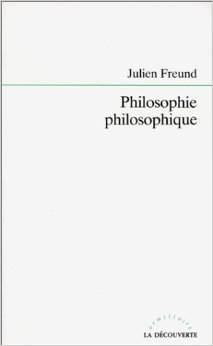 Julien Freund s'amuse de cette interpellation surannée. Jamais, cependant, malgré des années de complicité, je ne me suis départi à son égard de ces antiques politesses.
Julien Freund s'amuse de cette interpellation surannée. Jamais, cependant, malgré des années de complicité, je ne me suis départi à son égard de ces antiques politesses.
- Monsieur le professeur... Vous n'avez pas réagi à l'hypothèse que je formulai tout à l'heure concernant cette propension du discours antiraciste à favoriser malgré lui l'actualisation dans le quotidien de toute cette latence raciale, ethnique, tribale... Je voulais dire qu'en interpolant dans ses homélies... dans ses admonestations, de constantes références à ces classifications, il sollicitait pour ainsi dire ses destinataires à interpréter les problèmes de cohabitation qu'ils expérimentent dans ces termes-là. En bref, je suis tenté de penser qu'il contribue à " raciser " les tensions. D'autant que ce discours est performatif. Il vient quasiment du ciel...
J.F. - Ce n'est pas le ciel lumineux des idées selon Platon !
P.B. - ... C'est le pouvoir céleste du devoir-être. Sans compter que les curés y mettent aussi du leur.
J.F. - Pensez-vous sincèrement que les gens aient besoin d'être stimulés par ces élucubrations, même de façon oblique, pour ressentir les choses comme ils les ressentent ? Si l'on tient à établir un lien entre l'univers des discours et la manière dont les gens interprètent leur expérience, il y a selon moi quelque chose de plus frappant qui mériterait d'être creusé ; c'est cette occupation obsessionnelle de nos media par la seconde guerre mondiale ; plus exactement par le nazisme. Vous ne pouvez pas vous en souvenir, mais dans les années cinquante, soixante, Hitler était pratiquement oublié. Nous vivions dans l'euphorie de la reconstruction et, notre actualité politique, c'était quoi ? La guerre froide et les conflits coloniaux, c'est-à-dire des évènements concomitants. Les communistes célébraient pieusement le mensonge de leurs 75 000 fusillés et les anciens de la Résistance se retrouvaient rituellement devant les monuments aux morts. C'était tout. Ce passé, pourtant proche, était en cours de banalisation. Rien d'ailleurs que de très ordinaire dans cette lente érosion ; c'est un critère de vitalité. Aujourd'hui, en revanche, ce passé fait l'objet de constants rappels incantatoires. Hitler est partout, accommodé à toutes les sauces. C'est le nouveau croquemitaine d'une société qui retombe en enfance et se récite des contes effrayants avec spectres, fantômes et golem...
P.B. - Vous ne croyez pas aux revenants ?
J.F. - J'incline à penser que ces revenants sont utiles à certains. Hitler est devenu un argument polémique, et pas seulement en politique. A défaut de vouloir faire l'histoire contemporaine, nous fabriquons du déjà-vu, du simulacre, du pastiche. L'Hitlérisation du présent est un symptôme.
P.B. - La paramnésie ou impression de déjà-vu ; c'est un trouble hallucinatoire ; un signe de grande fatigue dit-on. Mais tous ces regards braqués sur le rétroviseur, cela veut dire aussi que l'avenir a perdu de son prestige. Il ne cristallise plus d'attente messianique. Le progressisme prend soudainement un coup de vieux.
J.F. - Sciences et techniques conservent leur ascendant, mais peut-être, effectivement, ne se prêtent-elles plus aux même amplifications eschatologiques qu'autrefois. L'écologisme grandissant est révélateur d'un désaveu. En tout cas ce Hitler qui nous hante, ce n'est pas celui dont nous célébrions la défaite en 1945, ce führer militariste, pangermaniste et impérialiste, ennemi de la France et de la Russie. Non ; celui qu'on commémore à tout instant pour en exorciser les crimes, c'est l'ethnocrate raciste, antisémite et genocidaire.
P.B. - On ne peut pas lui reprocher d'être anti-arabe ; c'est dommage.
J.F. - Anti-arabe, sûrement pas... le grand mufti de Jérusalem et même Nasser...
P.B. - Et Bourguiba parlant à Radio-Bari dans l'Italie de Mussolini.
J.F. - Le fascisme c'est tout autre chose ! Je vous donnerai une communication que j'ai faite à Rome sur ce sujet il y a quelques années.
P.B. - La mémoire imparfaite des nouveaux clercs confond allégrement les deux. C'est d'ailleurs l'épithète stalinienne de " fasciste " qui s'est finalement imposée...
J.F. - Mais vous n'êtes pas de leurs épigones... Bérard... Ce Hitler qui monte sans cesse à l'assaut du présent pour lui donner du sens, ce n'est pas un objet historique. Qu'est-ce qu'un objet historique ? C'est d'abord une matière suffisamment refroidie, tenue à distance des passions, autant que faire se peut. C'est ensuite une matière à travailler selon les règles éprouvées de la scientificité. Il a fallu plus de deux siècles pour les élaborer... et nous en sommes là ! Comme le diable des prêcheurs médiévaux, Hitler est devenu la caution négative d'une mémoire invasive et impérieuse. Il est interdit de se dérober à son appel sous peine de se voir soupçonné d'incivisme, voire d'obscure complicité avec...
P.B. - ... Avec la " bête immonde "...
J.F. - Pauvre Brecht ! Pour lui le ventre fécond, c'était celui de la social-démocratie. Et tous ces ignares qui le citent de travers !
P.B. - L'antifascisme commémoratif avance au même rythme que l'analphabétisme... Nous frisons l'excès de vitesse.
J.F. - Moi, je ne marche pas dans ces combines.
P.B. - La surexposition du nazisme est l'aliment principal de cette mémoire dont vous parliez. Ce qui me frappe, dans une époque qui se flatte d'obéir aux principes de la rationalité, c'est cette abdication de l'histoire face aux injonctions de la mémoire. Comme discipline en effet, l'histoire doit pouvoir rendre compte de ses matériaux et de ses méthodes, qu'il est toujours loisible de contester. La mémoire, elle, est infalsifiable. Elle s'impose comme un bloc de sensibilité. Elle n'a pas de méthodologie explicite. Ses critères sont flous, mais elle ne s'en impose pas moins comme une vérité inéluctable. Comme vous le suggériez à l'instant, il ne nous est pas permis d'en contester l'évidence sous peine d'anathème. Elle ne fait pas le partage entre le vrai et le faux, mais entre les bons et les méchants ; et c'est vrai que dans cette mesure, son triomphe engloutit tout un pan de l'esprit occidental. Cette volonté patiente de savoir, de débusquer le réel accessible, hors de tout préjugé fidéiste, de tout carcan dogmatique. La mémoire parle dans un idiome qui n'est pas universalisable, et, d'ailleurs, personne ne s'offusque de voir se répandre dans le langage courant des syntagmes comme " mémoire ouvrière ", " mémoire de l'immigration ", " mémoire juive ". Autant d'usages qui enregistrent et proclament la fragmentation particulariste dont il est derechef interdit de tirer des conclusions. Toujours, la mémoire s'authentifie comme un idiotisme et l'étrange, dans ces conditions, c'est qu'elle soit devenue l'argument fatal de ceux qui se réclament de l'universalisme...
J.F. - Ah, mon cher Bérard... Je préfère vous comprendre à demi-mot. Mais ce qui me frappe dans cette mémoire dont nous parlons, c'est son arrogance normative et cette morgue explicative, cette infatuation qui l'habilite à conclure en tous domaines.
P.B. - C'est l'ouvre-boîte universel... Comme ce célèbre couteau suisse à manche rouge, propre à tous les usages.
J.F. - Oui, mais en pratique, c'est le fameux couteau de Lichtenberg : il n'a pas de manche et il est dépourvu de lame. La suréminence de cette mémoire prend d'autant plus de relief qu'elle sévit dans une époque de rejet des filiations... d'amnésie massive. Et puis, c'est extraordinaire, son monolithisme sentimental. Un agrégat d'émotions n'est pas susceptible de la moindre tentative d'invalidation. Face à ça, nous demeurons médusés. Le mot qui convient le mieux pour décrire ce climat est celui d'hyperesthésie. Nous sommes à l'opposé de l'ascèse qui préside toujours à l'établissement d'un discours rigoureux. C'est encore Nietzsche qui dans La Volonté de puissance parle de cette irritabilité extrême des décadents... Oui, l'hyperesthésie fait cortège aux liturgies de la mémoire.
P.B. - C'est pourquoi sa carrière ne rencontre pas d'obstacle. Chacun se découvre quand passe la procession du Saint Sacrement. Personne ne veut finir comme le chevalier de la Barre.
J.F. - Voltaire nous manque, ou plus exactement cet esprit d'affranchissement qu'il a su incarner d'une manière si française...
P.B. - L'esprit de résistance ?
J.F. - La Résistance... Vous savez comme je l'ai faite dès janvier 1941. Pourtant, on fait circuler des rumeurs à mon propos... Je pense que cette mémoire manipulée participe de l'entreprise de culpabilisation des Européens.
P.B. - Ce passé ne vous protège pas contre l'infamie ?
Julien Freund laisse échapper un soupir de lassitude. Il regimbe à l'idée d'évoquer la forfaiture de ceux qui l'accablent en catimini.
J.F. - Vous savez, poursuit-il... le Résistant qui fut l'emblème héroïque des années d'après-guerre quitte aujourd'hui la scène au profit d'autres acteurs. Je ne m'en afflige nullement puisque j'ai toujours refusé les honneurs. Le Résistant, c'est un combattant, il fait en situation d'exception la discrimination entre l'ami et l'ennemi et il assume tous les risques. Son image ne cadre pas avec l'amollissement que l'on veut cultiver. C'est peut-être pourquoi on lui préfère aujourd'hui les victimes. Mais assurément, leur exemplarité n'est pas du même ordre. Ce que je voulais vous suggérer, j'y reviens, c'est la simultanéité de ces deux phénomènes ; le ressassement du génocide hitlérien et l'obsession antiraciste. Ils se renvoient sans cesse la balle dans un délire d'analogie. C'est extravagant. La mémoire produit un effet de sidération qui confisque l'immigration et nous interdit d'en parler autrement que dans le langage de son intrigue.
P.B. - La grammaire triomphante du génocide inaugure le règne de l'anachronisme et les nouveaux antiracistes bondissent d'émotion à l'idée d'entrer en résistance contre une armée de spectres.
J.F. - Oui... Ils sont à la fois la résistance et ses prestiges, et l'armée d'occupation avec ses avantages. C'est burlesque.
P.B. - Une mémoire incontinente...
J.F. - Qui épargne les crimes soviétiques, amnistiés avant d'avoir été jugés !
P.B. - Oui, mais leur finalité était grandiose ... la réconciliation définitive du genre humain, comme pour les antiracistes...
J.F. - Le seul communiste que j'ai connu dans la Résistance ; ce fut après mon évasion de la forteresse de Sisteron. Il dirigeait un maquis F.T.P. de la Drome. C'était un alcoolique doublé d'un assassin. A Nyons, il a flanché dans les combats contre les S.S. et je me suis retrouvé seul au feu avec quelques Italiens. Il fut néanmoins décoré d'abondance, et c'est pourquoi j'ai refusé toutes les médailles... à l'exception d'une médaille allemande !
P.B. - Ce qui mobilise la mémoire unique, ce n'est pas tant la liquidation du passé que sa persécution réitérée. Non seulement la mémoire met l'histoire en tutelle mais elle s'érige en tribunal suprême. Sous son regard myope, le passé n'est qu'une conspiration maléfique. On arraisonne les morts pour les accabler de procès posthumes et dénoncer leurs forfaits. Il n'y a jamais de circonstances atténuantes.
J.F. - C'est la rééducation du passé par les procureurs de l'absolu. Cette génération hurlante n'a connu que la paix ; ce sont des nantis de l'abondance qui tranchent sans rien savoir des demi-teintes de l'existence concrète dans les temps tragiques. L'ambivalence et les dilemmes sont le lot de ce genre d'époque. Nos pères ne furent pas des couards.
P.B. - La vertu n'a que faire de la vérité et vous voici, vous, Julien Freund, agoni comme ci-devant Résistant...
J.F. - " Ci-devant Résistant " ! Celle-là, on ne me l'avait jamais faite...
Le rire massif de Freund écrase la salle de sa gaieté. Le restaurant est vide depuis un bon moment déjà, mais le patron, derrière son comptoir, ne moufte pas. A Villé, on ne dérange pas le professeur, ce monsieur tellement affable et qui a écrit tant de gros livres.Penché sur la table dont il a écarté assiettes et couverts, il reprend le fil de ses pensées en martelant les mots.
J.F. - Le Bien ne fait pas de concession. Les croisés du Bien ne connaissent pas le doute. Les fins sublimes qu'ils s'assignent balayent tous les scrupules.
P.B. - La réconciliation définitive après la lutte finale contre la xénophobie...
J.F. - La xénophobie, c'est aussi vieux que le monde ; une défiance de groupe, d'ordre comportementale, vis à vis de l'étranger. L'expression d'un ethnocentrisme universel comme l'a rappelé Lévi-Strauss. On veut aujourd'hui la confondre avec le racisme qui est un phénomène moderne ; la confondre pour lui appliquer à elle aussi le sceau de la réprobation. Certes, il y a aussi des expressions chauvines de l'ethnocentrisme qu'il convient de combattre, mais prétendre le réduire absolument, c'est parier sur un avenir où l'idée de société différenciée avec ses particularismes aurait complètement sombré. Il n'y a d'ethnocentrisme et de xénophobie que dans la mesure où il y a pluralité des mondes. On peut imaginer - pur exercice d'utopie - que l'effacement des communautés et des identités collectives aboutirait à l'extinction de la xénophobie ; mais en fait à quoi ressemblerait cet Eden ? Selon la fiction de Hobbes, ce serait le retour à la lutte de tous contre tous... une lutte implacable et continuelle, dont seule nous protège la constitution de l'humanité en sociétés organisées et rivales.
P.B. - La xénophobie, c'est donc le prix à payer pour prévenir la barbarie.
J.F. - Si vous dites ça comme ça, vous serez vous-même traité de barbare !
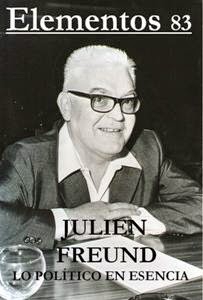 Julien Freund rit longuement, ressert une rasade de pinot noir et s'offre un excursus pointu sur l'origine des différents cépages alsaciens. Et, comme toujours lorsque la conversation prend ce tour grave qui sied au plaisir du boire et du manger, il surligne d'un index didactique ses propos les plus définitifs. Nous buvons...
Julien Freund rit longuement, ressert une rasade de pinot noir et s'offre un excursus pointu sur l'origine des différents cépages alsaciens. Et, comme toujours lorsque la conversation prend ce tour grave qui sied au plaisir du boire et du manger, il surligne d'un index didactique ses propos les plus définitifs. Nous buvons...
- Moi aussi, reprend-il après ces longues minutes, je dois être un barbare... La presse italienne, savez-vous, m'accuse avec Alain de Benoist et quelques autres d'être l'inspirateur des récents attentats dans la péninsule... Que répondre à de telles affabulations ? Notre ami répond-il à ces balivernes ?
P.B. - C'est probable, mais les droits de réponse sont souvent caviardés et la procédure judiciaire est coûteuse. Face à nos détracteurs le combat est inégal.
J.F. - Il n'est pas honorable, ni même utile, de se faire passer pour des martyrs ; l'iniquité étant la règle du jeu, il faut, non pas s'en accommoder, mais déplacer le champ polémologique et viser, non pas les ramasse-crottes du journalisme mais ceux qui les inspirent. C'est à l'amont de l'écriture quotidienne du journal que se situent les véritables enjeux... Le reste, comme disait de Gaulle, c'est l'intendance...
Cette question de la Résistance me turlupine, vous savez, et vous me poussez à mieux définir ma pensée. Jonglant avec ce que j'ai appelé ailleurs " fascisme spécifique " et " fascisme générique ", l'agit-prop communiste a fabriqué une conception à la fois fausse et infiniment extensive du fascisme allégrement confondu avec le nazisme... Soit. Le communisme pourrait disparaître mais l'antifascisme parodique survivra à son géniteur, car il arrange trop de monde. Ce fricot, il est toujours sur le feu. Les dispositifs médiatiques de manipulation de l'imaginaire l'ont installé dans l'opinion comme un mode d'interprétation idéaltypique de l'histoire contemporaine. Il faut donc s'attendre à des rechutes à n'en plus finir d'autant que l'analphabétisme historique s'étend au rythme même de l'emprise journalistique sur la culture ambiante. Et ces récidives antifascistes sont d'autant plus inévitables que le fascisme a été érigé en clé de voûte maléfique de tout un appareil de brouillage idéologique et de coercition morale. D'ailleurs le refus de prescrire les crimes qui lui sont liés, et seulement ceux-là, en dit très long sur ce statut d'exception, car c'est toute la tradition européenne du droit qui est ici mise en cause... Une telle adultération de notre humanisme juridique ouvre la voie à des procédures à répétition avec mise en spectacle idoine... Bref, je disais tout à l'heure que le souvenir de la Résistance combattante devait s'effacer parce que son image renvoie d'une manière trop explicite au patriotisme. Il y a donc bien une contradiction entre le recyclage continue d'un fascisme mythique et malfaisant et l'occultation progressive de ceux qui ont combattu le fascisme réel, les armes à la main. Cette bizarrerie tend à montrer que le même mot renvoie bien à des réalités différentes... La Résistance est partie prenante de l'ancien monde, celui des réflexes vitaux qui se mettent en branle lorsque le territoire est envahi par l'ennemi. Les nouvelles de Maupassant montrent très bien cela dans un contexte où le nazisme n'avait pas cours. Or, c'est ce lien quasiment paysan à la terre que l'on prétend aujourd'hui abolir parce que les élites, elles, se sont affranchies de ces attaches... Elles deviennent transnationales et discréditent des liens qui sont pour elles autant d'entraves. Dans ce contexte, le maquisard devient un personnage encombrant... Trop rivé à son sol, à ses forêts, à sa montagne...
P.B. - Un franchouillard à béret basque, un chouan...
J.F. - Sans aller jusque là, il n'est plus le prototype de l'avant-garde historique.
P.B. - Sauf s'il est Arménien, républicain espagnol ou déserteur de la Wehrmacht.
J.F. - Oui, l'Affiche Rouge, qui renvoie à la dimension internationaliste... Le fait que des intellectuels à prétention cosmopolite se mettent à critiquer les programmes de certains mouvements comme celui d'Henri Frenay en leur imputant des arrière-pensées pétainistes est révélateur de ce nouveau climat. Au nom de la démystification, il s'agit de priver la Résistance de son prestige. Non seulement la plupart des Français auraient été attentistes ou collaborationnistes, mais même la petite frange des résistants de la première heure devrait être soupçonnée des pires ambiguïtés.
P.B. - Jusqu'en 1942 au moins, beaucoup de résistants ne se définissent pas comme opposants à Pétain et il y a parmi eux de nombreux officiers et même des camelots du roi.
J.F. - Bien sûr, les frontières demeurent floues et c'est justement ça que l'antifascisme rétrospectif ne peut pas comprendre, car il ne fonctionne que dans le cadre d'un manichéisme reconstruit à partir du légendaire communiste. En dépouillant la Résistance de son aura, on dépossède les Français d'un passé glorieux pour les assigner à leur essence perfide. Ils sont déshérités et reconduits à la guerre civile latente et permanente... et par ceux-là même dont la fonction est de fabriquer du consensus.
P.B. - Même au prix du mensonge ? Car enfin, les résistants, comme les collaborateurs, ne furent qu'une minorité.
J.F. - Mais oui, mon cher Bérard, au prix du mensonge !
Dépourvu d'afféterie, Julien Freund s'amuse à jouer avec ces blasphèmes innocents. Son visage alors se craquelle de mille rides et se pétrifie dans un rictus silencieux. Il fixe longuement l'interlocuteur puis cède d'un seul coup à la plus franche hilarité.
- Le mensonge, tonne-t-il à nouveau tandis que le masque se fait plus sévère... C'est Machiavel qu'il faut suivre. Certes, il n'y a pas de politique morale, mais il y a une morale de la politique qui implique parfois le mensonge quand celui-ci est utile à la concorde intérieure... Une fois désenchantée, la Résistance ne peut plus être un gisement de mémoire et l'opprobre inocule désormais toute notre histoire... Vous comprenez, la sphère du politique n'est pas celle de l'histoire. L'histoire obéit à des méthodes critiques qui aboutissent nécessairement au désenchantement ; son rôle est démystificateur. Sous son emprise le passé devient trivial. Mais là, c'est autre chose... C'est autre chose pourquoi ? Mais parce que le changement de perspective auquel nous assistons n'est pas le produit de la réflexion historique. Ceux qui le conduisent sont indifférents aux archives ; ce ne sont pas des chercheurs, mais des idéologues. D'ailleurs, aucun chercheur ne pourrait disposer de l'écho médiatique dont ils jouissent. Cet écho démesuré montre que leur discours entre en résonance avec les intérêts du pouvoir, pour des raisons que j'ignore...De même que le résistancialisme des années cinquante permettait de blanchir le passé, et d'amnistier les collaborateurs, la profanation du mythe résistant, d'une France toute entière insurgée contre l'occupant permet de le noircir. De la magie blanche à la magie noire, il y a comme une transfusion de signification, mais on demeure dans la magie ; pas dans l'histoire. Car, si le sens du récit bascule, on ne le doit pas à des découvertes inattendues, à des connaissances nouvelles. Seule change l'interprétation. Hier, elle servait à bonifier. Aujourd'hui, elle s'acharne à péjorer. C'est toujours de la prestidigitation !
Julien Freund soupire, mais son regard pétillant de malice dément l'impression d'accablement qu'un observateur distrait pourrait tirer d'une pareille attitude. Sa respiration exhale un bruit de forge. Il s'éclaircit la voix, finit son verre et poursuit.
- Le mensonge de l'immédiat après-guerre colportait la fable d'une France occupée rassemblée derrière de Gaulle. Le mythe était soldé par la condamnation hâtive d'une poignée de traîtres choisis parmi les figures les plus visibles de la littérature et de la politique. Cette imposture avait une finalité politique honorable ; c'était une thérapie collective pour conjurer la discorde et abolir le risque d'une guerre civile sans cesse perpétuée... Le tournant s'est opérée dans les années soixante-dix, à la fin justement des Trente glorieuses. Ce qui n'était jusque là qu'une poignée de brebis galeuses est devenue l'expression la plus éloquente d'un peuple de délateurs et de renégats. C'est alors qu'on a commencé de parler d'une épuration bâclée et trop rapidement conclue. Epilogue fatal : puisque le crime était collectif, c'est bien la nation dans son essence qui était viciée. Il lui fallait donc expier massivement. C'est aussi à cette époque que de l'Inquisition aux Croisades et aux génocides coloniaux l'ensemble de notre histoire s'est trouvée indexée à la collaboration et à ses turpitudes... Maintenant elle envoûte de sa malédiction l'ensemble du passé... Peut-être est-ce lié au progressisme qui situe le meilleur dans l'avenir et doit en toute logique déprécier le passé pour le ravaler à l'obscurantisme et à la sauvagerie ? Mais les Trente glorieuses pourtant ont été furieusement prométhéennes sans que n'y sévisse ce masochisme extravagant. Il s'agit donc bien d'un phénomène plus profond qu'il faut rapporter à cette morbidité européenne dont nous parlions tout à l'heure.Ce que je constate, voyez-vous, c'est que durant trente ans, les élites, usant d'un pieux mensonge... oui, un bobard... ont célébré un peuple exemplaire en le dotant d'un passé glorieux. Et, simultanément, ces élites se montraient capables d'entraîner le pays dans une oeuvre imposante de reconstruction, jetant les bases d'une véritable puissance industrielle, promouvant la force de frappe nucléaire, s'engageant dans la réconciliation avec l'Allemagne et l'édification d'un grand espace européen tout en soutenant plusieurs conflits outre-mer. Nonobstant certaines erreurs, ce fut un formidable effort de mobilisation stimulé par une allégresse collective comme la France n'en avait pas connue depuis longtemps...
P.B. - Tout cela malgré les faiblesses dont on stigmatise la quatrième république.
J.F. - Je connais ces critiques puisque, comme vous le savez bien, je suis gaulliste comme je suis aussi européen et régionaliste... mais la nature des institutions n'a ici qu'une faible pertinence. C'est la pâte humaine qui est décisive et les grands courants d'idée et d'humeur qui traversent la population. La rhétorique n'est pas sans conséquence ; il y a des récits toniques et d'autres qui, en revanche, nourrissent la neurasthénie. Dans l'ordre du discours, nous sommes passés de l'éloge à la disgrâce, de la gratification à l'affliction. Pareto associait déjà la décadence et le mépris de soi. C'est dans Les systèmes socialistes qu'il écrivait : " On éprouve une âpre volupté à s'avilir soi-même, à se dégrader, à bafouer la classe à laquelle on appartient, à tourner en dérision tout ce qui, jusqu'alors, avait été cru respectable. Les Romains de la décadence se ravalaient au niveau des histrions. "
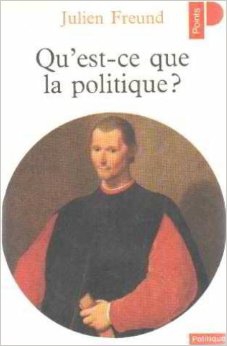 La mémoire livresque de Julien Freund est surprenante. Il détient dans ses réserves des milliers d'extraits, parfois très longs. Il en émaille sa conversation savante avec le souci constant de rembourser sa dette vis à vis de grands textes. L'art de la citation est toujours chez lui un exercice d'humilité, une manière de reconnaître que beaucoup d'autres ont inscrit leur empreinte dans sa propre pensée. C'est dire tout ce qui le distingue de l'enflure pédante de ces clercs qui abritent leur arrogance derrière le rempart des signatures prestigieuses. Julien Freund, lui, ne cède pas au goût du décor ; il fait vibrer la pensée des Anciens et, c'est toujours amarré à ces références patiemment ruminées qu'il affronte les problématiques du présent. Car, en effet, il rumine, triture et mâchonne comme le conseillait Nietzsche. Lenteur délibérée de la méditation ; tempo ralenti d'une pensée qui se construit par sédimentation et élagage ; discipline de la prudence, exercice du doute probatoire... Tout un univers qui fait contraste avec l'impulsion qui étend partout son empire au nom d'une authenticité factice et d'urgences fantasmatiques.
La mémoire livresque de Julien Freund est surprenante. Il détient dans ses réserves des milliers d'extraits, parfois très longs. Il en émaille sa conversation savante avec le souci constant de rembourser sa dette vis à vis de grands textes. L'art de la citation est toujours chez lui un exercice d'humilité, une manière de reconnaître que beaucoup d'autres ont inscrit leur empreinte dans sa propre pensée. C'est dire tout ce qui le distingue de l'enflure pédante de ces clercs qui abritent leur arrogance derrière le rempart des signatures prestigieuses. Julien Freund, lui, ne cède pas au goût du décor ; il fait vibrer la pensée des Anciens et, c'est toujours amarré à ces références patiemment ruminées qu'il affronte les problématiques du présent. Car, en effet, il rumine, triture et mâchonne comme le conseillait Nietzsche. Lenteur délibérée de la méditation ; tempo ralenti d'une pensée qui se construit par sédimentation et élagage ; discipline de la prudence, exercice du doute probatoire... Tout un univers qui fait contraste avec l'impulsion qui étend partout son empire au nom d'une authenticité factice et d'urgences fantasmatiques.
Machiavel, raconte Julien Freund, fut proscrit plusieurs années dans une bourgade, à bonne distance de Florence. Dans une lettre datée de son exil, il confie comment après avoir vaqué durant la journée aux affaires quotidiennes, il regagne le soir sa maison, revêt ses habits princiers et pontificaux pour se retrouver en compagnie des grands auteurs du monde antique. " Je les interroge et ils me répondent ", écrit-il superbement... Si donc, la citation chez Julien Freund n'est jamais pontifiante, elle veut en revanche signifier que dans la guerre des idées, il n'est pas un voyageur sans bagage. Les auteurs qui lui répondent en attestent. Entre eux et lui se nouent des amitiés posthumes où l'on voit s'esquisser le motif de la tradition. La tradition ; non pour s'embourber dans une répétition stérile - référence n'est pas révérence - mais pour suggérer ces permanences essentielles auxquelles nous avons donné le nom de civilisation. Acquiescer à l'héritage et l'enrichir à des sources nouvelles. Julien Freund est aussi un passeur. Il contribue à la réception française de Max Weber, de Vilfredo Pareto et surtout de Carl Schmitt ; et dans ce dernier cas, il n'hésite pas à franchir l'Achéron à ses risques et périls. La citation n'est pas toujours une occupation de tout repos.
- Nous sommes entrés dans un nouveau cycle, poursuit Julien Freund. Aux laudes de l'après-guerre les élites ont substitué une autre musique en vouant nos prédécesseurs aux gémonies. En bref, elles vitupèrent et sermonnent, embarquant le pays dans une véritable industrie du dénigrement. Et, qu'est-ce qui accompagne cette remontrance continuelle, qu'est-ce qui fait cortège à cette mémoire mortifiante ? Depuis les années soixante-dix, c'est une dénatalité préoccupante, un délitement alarmant du lien social, une extension de l'anomie et de la violence sauvage, une croissance structurelle du chômage installant des millions de nos concitoyens dans l'assistance et l'irresponsabilité, alourdissant le poids de l'Etat-providence, et pour clore la litanie des décombres, une démobilisation civique effrayante... Et je n'évoque que pour mémoire la détresse du politique, si révélatrice de l'aboulie de la volonté.
Oui, je maintiens qu'en politique il faut savoir mentir à bon escient ; non pour dissimuler la corruption du pouvoir comme on le voit faire si souvent aujourd'hui, mais pour doter les vivants d'un passé supportable, rasséréner l'identité collective, renforcer l'estime de soi. Des élites qui accablent les morts pour fustiger leur peuple ne sont pas dignes de le gouverner. " Salus populi suprema lex esto ", mon cher ; cet adage, Pareto le rappelle après Hobbes, c'est le but de la politique. La protection de la collectivité par la ruse comme par la force. La ruse du discours afin de servir un roman national suffisamment vraisemblable pour ne pas laisser le champ libre au persiflage et suffisamment gratifiant pour agréger les énergies. La force étant ici celle, pondérée, de l'institution, distincte de la violence caractéristique, elle, du chaos qui s'avance.Je note, par ailleurs, qu'après ce qu'on a appelé leur " miracle ", l'Italie comme l'Allemagne connaissent aujourd'hui une évolution comparable à la nôtre. En Allemagne notamment, la diffamation du passé a pris une dimension délirante qui n'épargne même pas la Prusse du despotisme éclairé, un Etat qui fit l'admiration de tous nos philosophes de Voltaire à Renan... Toute réminiscence y renvoie à la faute et au procès au point que les jeunes générations se trouvent condamnés au plus extrême dénuement historique... Des orphelins privés d'héritage et soumis au joug d'un éternel présent !
Rappelez-vous ce que dit le dernier homme de Zarathoustra. Il dit " Jadis tout le monde était fou ". Et il ajoute en clignant de l'oeil : " Qu'est-ce qu'aimer ? Qu'est-ce que créer ? Qu'est-ce que désirer ?" Il exprime en même temps le sentiment de supériorité de l'homme moderne et son incapacité à donner sens aux verbes aimer, créer, désirer ; les actions élémentaires de l'existence. L'homme moderne en rupture d'antécédant est condamné à l'indigence et à la stérilité ; il n'est plus créateur... Vantardise et impuissance voilà son apanage ! En l'occurrence, pour ce qui concerne l'Allemagne, l'hyper morale y secrète une fausse conscience qui confine à une dénationalisation brutale et dangereuse... Oui, la pénitence est devenue tout à la fois l'outil imparable et le solennel alibi d'un vandalisme inédit.
P.B. - C'est la furia teutonica enrôlée cette fois contre ses propres assises. Il ne s'agit pas tant de révoquer l'histoire que de la rendre présente, sans cesse, comme un remord incurable. Jusque dans la tombe l'oeil réprobateur pétrifie le Caïn germanique pour lui inspirer une honte éternelle... Il lui est interdit de boire les eaux du Léthé...
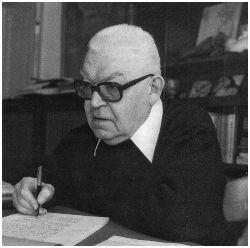 J.F. - Les Anciens connaissaient les vertus pacifiantes de l'oubli ; mais les nouveaux prédicateurs veulent-ils la paix ?
J.F. - Les Anciens connaissaient les vertus pacifiantes de l'oubli ; mais les nouveaux prédicateurs veulent-ils la paix ?
P.B. - Harcelés par des antécédents criminels mais pressés de se faire admettre dans l'humanité post-totalitaire, les Allemands se sont faits récemment les oblats opiniâtres d'une nouvelle coquecigrue ; le patriotisme constitutionnel à la Habermas...
J.F. - Du point de vue sociologique, c'est une absurdité, car il n'y a pas de société qui pourrait être une création ex-nihilo. Il n'y a pas d'être-ensemble sans ancrage identitaire. Les groupes humains ne peuvent pas vivre en apesanteur. La théorie d'Habermas, c'est une nouvelle version du syndrome utopique qui travaille les idéologues depuis le XVIème siècle, mais elle est révélatrice d'une aporie. Elle prétend en effet fonder son patriotisme sur l'abjuration des pères. Il s'agit donc de tout autre chose que de patriotisme...
P.B. - Illustration de la pseudomorphose selon Spengler. Le mot demeure incrusté dans la langue, mais il a changé de signifié.
J.F. - Il ne désigne plus que des nuées... Déguisé en Ayatollah de la vertu, Habermas profère des fatwas. Il se félicite de la débâcle des méchants qui depuis toujours auraient précipité l'Allemagne dans un bellicisme sanglant...
P.B. - Depuis que les Chérusques firent un mauvais sort aux légionnaires romains de Varus ?
J.F. - Pourquoi pas, pendant qu'on y est ! Après avoir déblatéré sans répit, quand tout a été déblayé, épuré, à quel fondement accrocher l'être collectif allemand ? Les fondements nous précèdent nécessairement. Mais quand tout ce qui nous précède est condamné à la débandade, sur quoi fonder la légitimité ? Sans doute sur un futur immaculé puisque imaginé selon les seuls mécanismes de la raison désincarnée... C'est l'essence même de l'utopie progressiste.
P.B. - Si nous résumons nos propos, nous pouvons dire que recru de brimades, le passé est aujourd'hui en déroute. Ajoutons qu'on en exhume les fonds de tiroirs que dans le seul but de nous jeter à la face les preuves de notre constante cruauté. Mais il y a autre chose. A propos des Allemands vous venez de parler de génération orpheline. La scélératesse des pères empêche en effet qu'on s'en réclame ingénument. Les mères en revanche paraissent mieux s'en tirer. Le discours contemporain, encore une fois depuis les années soixante-dix, tient de toute évidence à les disculper. Et pour ce faire, il les enrôle sous la bannière du féminisme, dans ces catégories souffrantes que les " mâles, blancs, morts ", comme on dit sur les campus américains, auraient depuis toujours tenues sous leur férule.
J.F. - Ma réflexion ne m'a jamais conduit vers ces questions, mais vos remarques sur le féminisme me ramènent à Auguste Comte, un penseur que j'ai beaucoup pratiqué. Comte, vous le savez, est l'inventeur du concept de sociologie. Comme les contre-révolutionnaires de son temps, il est conscient de la béance ouverte par la Révolution de 1789 ; c'est ainsi qu'il parle de l'immense gratitude des positivistes vis à vis de Joseph de Maistre et qu'il révoque les faux dogmes de l'individualisme et de l'égalitarisme. Il se veut tout autant l'héritier que le liquidateur de la Révolution. Comment surmonter l'individualisme dissolvant des modernes ? C'est à cette question qu'il tente de répondre et il le fait de manière mixte. En effet, à la différence des contre-révolutionnaires qui proposent une solution rétrograde assise sur la restauration du trône et de l'autel, Comte partage la certitude des Lumières selon laquelle l'humanité tend irrésistiblement vers l'unité cosmopolite. Cette convergence planétaire qu'il voit s'accomplir, comme les libéraux, par le truchement de l'économie, il entend la parachever et la corriger au moyen d'une nouvelle religion. Pour lui, il ne fait pas de doute qu'une communauté humaine ne peut assurer la fonction intégratrice nécessaire à la durée que par le lien religieux. Cette nouvelle religion fait la part belle aux savants, aux prolétaires et surtout aux femmes qu'il dépeint comme les préceptrices idéales de l'altruisme. Le féminisme de Comte reflète la prépondérance qu'il attribuait au sentiment. Une telle assimilation lui vaudrait sans aucun doute les sarcasmes, voire l'ire des féministes d'aujourd'hui.
Julien Freund débride un de ces rires énormes dont il n'est pas avare. L'effet désopilant du topique comtien sur les pétroleuses contemporaines excite sa gaieté. Puis, comme de coutume, il brise net l'hilarité et poursuit son exposé...
Bref, c'est la puissance affective impartie au coeur féminin qui permet de recoudre les lambeaux d'une société mise à mal par le bouleversement de 1789. Comme l'a montré Robert Nisbet, c'est toute la problématique de la sociologie naissante. Qu'est-ce qui peut relier les hommes quand ils ne sont plus confinés dans les ordres traditionnels et leurs réseaux d'obligations réciproques, quand l'obéissance ne va plus de soi ? Ce n'est pas tant la réponse constructiviste, en fait une religion d'intellectuel, qui fait l'originalité de Comte que le rôle souverain qu'il confère aux femmes, prophétesses d'une humanité régénérée. Cimentée par la religion de l'humanité, sa société positive met un terme aux errements de l'histoire humaine et ce dénouement... c'est ça qui est important, correspond avec la consécration du genre féminin.
P.B. - Culmination sociale de la femme et fin de l'histoire composent donc un système cohérent ?
J.F. - Pour Auguste Comte, c'est une évidence ; avec la techno-science et la tyrannie du sentiment. C'est comme cela qu'il se figure l'émancipation définitive. Ce qui est capital, c'est l'amalgame notifié par Comte entre féminisme et accession à un universel réalisé. Il inaugure un épisode dans lequel nous continuons de patauger.
Ceci étant dit, pour interpréter l'irruption conquérante du féminin dans le registre du politique, il faut aller au-delà du discours de Comte même si quelque chose d'inaugural se manifeste chez lui. En effet, comme chacun sait, la société traditionnelle pose la figure du père au centre de son imaginaire collectif. Il n'y a là nulle misogynie mais un partage des rôles qui attribue à la masculinité tout ce qui relève de la verticalité. Dans ces communautés, seuls les pères disposent du pouvoir symbolique d'engendrer, aussi bien le père de famille dans le domaine du privé, que le roi, père de ses peuples, dans la sphère du politique. De même Dieu est-il posé en père de l'humanité. Le modèle est organique et c'est la puissance d'engendrement du père qui justifie son pouvoir symbolique, même si, je le concède volontiers, il en va tout autrement dans l'ordre concret du domestique où les maîtresses-femmes n'étaient pas plus rares qu'aujourd'hui. Mais, ce n'est pas le concret quotidien avec ses multiples compromis qui importe ici, mais la métaphore qui traverse tant l'imaginaire des Anciens.
Au rebours de cette représentation qui inscrit le social dans l'ordre de la nature et de la reproduction, la société démocratique des modernes est supposée s'engendrer elle-même. Elle rejette la loi organique qui régit l'ensemble du cosmos et prétend, insolemment, ne devoir son existence qu'à la libre volonté de ses sociétaires. C'est un nouveau régime mythique qui se met en place. La société y survient ex-nihilo... à partir d'une table rase, d'où sa difficulté à concevoir des antécédents susceptibles de la déterminer. Récusant la naissance, faisant son deuil du fardeau de l'ascendance, elle veut lire dans ses origines séraphiques la promesse de son émancipation infinie.
La nature est ici congédiée au bénéfice de l'artifice et du fantasme de la maîtrise. Les modernes ont substitué l'artifice à la nature et leur société étant conçue idéalement comme une construction purement volontaire est du même coup considérée comme indéfiniment malléable, perfectible à souhait sur le modèle de la technique. L'idée d'une sociabilité intrinsèque à la nature humaine se trouve supplantée par la fiction d'un contrat fondateur d'essence marchande prescrit par la convergence des intérêts, qui elle-même commande la résolution des individus contractants. Les sociétaires sont libres d'en amender les termes pour autant que l'utilité l'exige. Cette philosophie qui ne veut voir dans la société que le produit de conventions arbitraires, quoiqu'elles soient dictées, en dernière instance, par les déterminants économiques, implique aussi bien la réforme que la révolution, les ajustements empiriques que les bouleversements violents...
P.B. - Bien sûr, le rejet de tout principe transcendant conduit au marivaudage législatif... Issue donc du miracle contractuel, la société se laisse interpréter comme une parfaite épiphanie. Sans père, sans mère, sans généalogie, elle tombe toute faite, non pas de la cuisse de Jupiter, mais du ciel des idées. Mais alors, pourquoi ce retournement des polarités ? Pourquoi passe-t-on d'une symbolique verticale et masculine quand on honorait les racines, le lignage, la continuité à une modernité d'autant plus réfractaire à l'image paternelle qu'elle décline toute obligation à l'égard de la souche générique ? Car il ne fait guère de doute que notre présent se reconnaît dans l'allégorie féminine. La métaphore féminine imbibe la lecture du social et du politique.
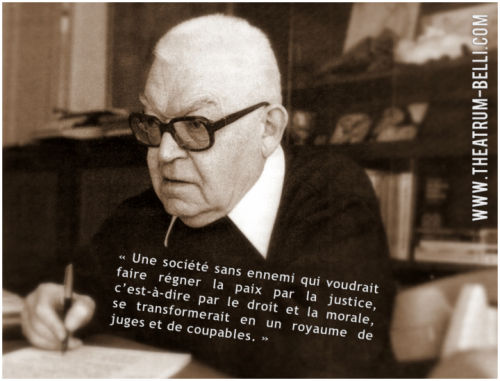
J.F. - La femme comme genre, sans doute ; pas la femme comme mère, toujours plus occultée... évacuée du système référentiel.
P.B. L'individu contractant exige la reconnaissance de ses droits mais ne veut admettre aucune dette. La déliaison est la fausse monnaie inéluctable de sa liberté. Donner, recevoir, rendre : c'étaient les trois séquences du système de don qui instituait le lien communautaire. L'économie était alors sous la coupe du social et du politique. Ce lien se dissout aujourd'hui au rythme de l'extension démesurée de l'ethos libéral et des procédures de marché. De même la conscience historique se décompose-t-elle dans le refus présentiste de l'héritage. De même qu'on se refuse à reconnaître toute obligation dans la dimension horizontale, celle qui implique les contemporains ; on s'y soustrait également dans la dimension verticale, celle des générations successives. Ni les ancêtres, ni les successeurs ne font sens. L'obligation de rendre est devenue une corvée, une servitude que seul l'impôt, paradoxalement de plus en plus lourd, se charge d'assumer dans l'anonymat bureaucratique. La transmission est en jachère... Nous payons très cher la rançon de la liberté moderne. Vous avez raison ; la mère après tout est aussi bien légataire que le père...
J.F. - L'individualisme... l'individualisme de masse est en train de déglinguer l'Europe. Mais je ne suis pas décliniste comme certains le prétendent : nous ne sommes pas surplombés par les exigences mystérieuses du fatum. Et, disant cela, nous nous affirmons aussi comme des modernes. La volonté n'a pas dit son dernier mot... Ce monde, voyez-vous, ne tolère que la louange. A cette mise en berne de l'audace critique, il faut opposer toujours le libre examen radical ; celui qui n'hésite pas à fouailler les origines... Je suis surpris par la paralysie de l'insolence chez les jeunes intellectuels. Ne forment-ils pas une de ces tribus maffesoliennes d'approbateurs loufoques... Ils croient s'opposer quand ils ne font que surenchérir sur la logique du système contemporain. Et puis, il y a l'aléa ; tout ce qui vient gâter le bel ordonnancement des plans, des projections, des programmes toujours dictés par la vue basse et le conformisme. Le désespoir serait une sottise. Il ne faut pas abdiquer. Il nous faut... Il faut se battre sans trêve. Notre liberté cherche son emploi ; elle n'est pas ce concept flou qui trône au sommet des formules. Notre liberté à nous, c'est une disponibilité pour la pensée et pour l'action ! Cela je l'ai écrit dans ma conclusion de " La décadence ". Je l'ai écrit pour des gens comme vous avec la certitude que vous sauriez me lire. L'Europe, pour se ressaisir et prendre en charge son destin, dispose de toutes les ressources nécessaires.
P.B. - Je reviens à cette Allemagne dont nous parlions. La mue post-totalitaire s'est opérée là-bas sous le signe de la déchéance des pères. Leur débâcle fut d'autant plus facile à solder que tous avaient porté l'uniforme des maudits. La damnation collective qui les frappait leur arrachait également ces titres consacrés par le temps qui les avaient depuis toujours porté à transmettre et à incarner. Avec l'autorité, principale cible de la dénazification, cette vocation leur était définitivement déniée. Ils sont devenus des producteurs et des consommateurs prosaïques, rivés dans leur mutisme, aussi consciencieux dans la voie de la " normalisation " qu'ils l'avaient été dans celle du " Sonderweg ". L'Allemagne, me semble-t-il, a surjoué le parricide, non pour se délester du fardeau de la culpabilité - cela lui est interdit - mais pour en alléger le poids. En se débarrassant de géniteurs encombrants, elle tentait de prouver sa bonne foi démocratique. N'oublions pas que les fascismes ont souvent été interprétés comme des manifestations du syndrome machiste... Le style fougueusement viril du Ventennio est, il est vrai, significatif à cet égard...
J.F. - Je ne pense pas qu'il soit judicieux de parler d'un art fasciste. Regardez le Trocadéro...
P.B. - Pour en rester au bannissement des pères, je me souviens parfaitement des termes dans lesquels la Fraction Armée Rouge revendiquait ses exécutions. Pour elle, en effet, il s'agissait, certes, d'épurer l'Allemagne de ces pères indignes que l'orthodoxie kominternienne désignait comme des monstres d'autant plus exemplaires que leur adhésion au capitalisme redoublait leur passé nazi. Mais en prime, on pointait leur phallocratisme comme un motif d'exécration irrévocable.
J.F. - Vous savez... Justifiant les noyades de Nantes, le conventionnel Carrier proclamait déjà que c'était par " principe d'humanité " qu'il purgeait " la terre de la liberté de ces monstres "...Porté à l'incandescence idéologique le concept d'humanité comme n'importe quel autre peut devenir une incitation au meurtre. Il n'y a pas d'idée tolérante ; il n'y a que des comportements tolérants. Toute idée porte en elle l'exclusivisme, et les énoncés mirobolants d'aujourd'hui n'échappent pas à cette règle.
P.B. - Si demeure en Allemagne une forme potentielle de despotisme, c'est bien celui de la guimauve. Au Führer Prinzip, caricature du principe masculin, succéderait un Etat d'essence maternelle. Après le big-brother totalitaire, la big-sister maternante.
J.F. - La boutade est amusante, mais ce que vous décrivez n'est pas un épiphénomène allemand. C'est une évolution qui touche l'ensemble de l'Occident. Ses origines ne sont pas réductibles à un terreau national particulier.
P.B. - Je suis d'accord, mais savez-vous, pour l'anecdote, qu'en Allemagne justement, dans les toilettes mixtes, les hommes sont exhortés à uriner assis. Cet exemple saugrenu montre que la parité taille sa route par des détours insolites.
J.F. - Ils sont obsédés par l'hygiène, comme les Américains du nord. Descartes notait déjà ce trait dans la Hollande calviniste du XVIIème siècle. Mais il ne faut pas s'y tromper : c'est toute la modernité qui dévale cette pente. Il y a une revendication démesurée des droits qu'un Etat ramolli et bienveillant s'efforce de satisfaire, car cette demande qui lui est adressée, elle contribue aussi à le légitimer. Le droit à la santé par exemple s'intègre dans cette extension illimitée, d'où le risque d'un despotisme thérapeutique. Car, enfin, la gratuité des soins conduit automatiquement l'Etat, dispensateur et gestionnaire du système de santé, à organiser une prévention collective toujours plus vigilante au nom de la rentabilité. La société du contrôle total est au bout de l'idéal hygiénique. Aboutissement qui n'est pas antinomique d'un Etat faible, d'un Etat apathique en tous cas dans le registre des fonctions régaliennes...
P.B. - L'oxymore de la puissance faible...L'Etat omnipotent et impotent.
J.F. - Oui, c'est ça. La santé ... L'obligation sanitaire pourrait être dans un proche avenir au fondement d'une nouvelle forme de totalitarisme. Le refus pathologique du vieillissement et de la mort, intimement lié à cet effacement de la transcendance dont nous parlions laisse aisément présager l'aptitude de nos contemporains à consentir au cauchemar climatisé dont parlait Bernanos. Le harcèlement que nous subissons à propos de l'alcool et du tabac donne un mince avant-goût de ce que nous pourrions subir. Nous sommes talonnés par des instruments de surveillance toujours plus sophistiqués, sans que cela ne soulève de réelles protestations. C'est la face noire du jeunisme qui nous assaille. Et le sportif exemplaire, la star athlétique, le dieu du stade, objet de toutes les sollicitudes publicitaires, c'est le point de mire de toute cette mécanique. C'est l'icône pathétique d'une propagande qui promet la rédemption du corps par un nouveau régime de salubrité imposé.
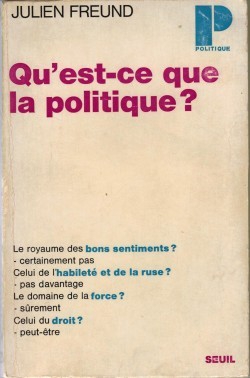 P.B. - Un sportif bourré d'hormones et d'anabolisants.
P.B. - Un sportif bourré d'hormones et d'anabolisants.
J.F. - Oui, c'est le triomphe du modèle artificialiste au nom d'une santé " naturelle " qui n'a rien à voir avec la nature.
P.B. - On pourrait gloser sur l'usage de plus en plus massif des psychotropes et sur cette diététique de facture industrielle qui vient briser les identités alimentaires. Autant de remèdes qui contribuent à détruire l'entre-soi sociétal et à renforcer le conditionnement individualiste. Dans le premier cas le dépressif est fortifié dans sa solitude par la camisole chimique ; ce n'est pas la relation aux proches qui le délivre de son mal. Dans le second cas, c'est la liturgie des repas familiaux et la commensalité amicale qui sont sacrifiés au nom du " régime ", de la " forme ", cette condition favorable aux performances, dont l'horizon s'éloigne sans cesse, avivant la déprime et le dégoût de soi. Derrière tout cela se profile la boulimie, bien réelle celle-là, des grands groupes pharmaceutiques et des multinationales de l'agroalimentaire. C'est l'obsession hygiéniste qui génère leurs profits ; c'est aussi pourquoi ils sont si prompts à sponsoriser l'élite sportive.
J.F. - Je préfère " parrainer " plutôt que " sponsoriser ".
P.B. - Mais le sportif n'est pas seulement un slogan vendeur. Il introduit ses admirateurs dans l'univers frelaté des records à produire. Son corps est en fait une machine souffrante et lucrative entièrement finalisée par l'empire du rendement... Un succédané que l'innocence du vivre a irrémédiablement déserté. De l'olympisme grec aux aristocrates britanniques, le sport fut toujours l'expression d'un otium ; avec la modernité tardive, il entre dans l'orbe du dressage productif ; il est rivé au negotium.
J.F. - L'économie comme destin ainsi que l'écrit Alain de Benoist...Vous savez, dans la perspective de ce que vous disiez tout à l'heure concernant big-sister, il faudrait se pencher sur ces deux évolutions parallèles, l'infestation de tout l'édifice social par l'économique et cette montée en puissance, non tant de la femme mais du féminin. Il faudrait réfléchir à cela en partant de l'étymologie du mot " économie ".
P.B. - L'oikos, évidemment. Chez les Grecs, c'est à la fois la gestion du domestique et le territoire imparti au règne de l'épouse. Si l'on suit les analyses de Louis Dumont, cet ensemble constitue un espace hiérarchiquement subordonné à l'espace politique qui est par définition celui des hommes, des citoyens. Si l'on en croit les éthologistes, cette répartition des rôles doit venir de très loin. Ce n'est d'ailleurs pas une raison pour la sacraliser. Cette répartition a été très consciemment réfléchie par les penseurs grecs dans le souci de distinguer le privé du public. Elle implique une inégalité des sexes qui n'est pas tant une inégalité des personnes qu'une sévère hiérarchie des fonctions que la tradition leur attribue. S'ajoute à cela dans le récit mythologique, décrypté par Vernant, l'idée d'une dangerosité spécifique au sexe féminin. C'est ce qu'exprime clairement le mythe de Pandore. Une propension à l'hybris que le politique a pour mission de contenir. Le christianisme s'est greffé sur cet héritage mythique avec la morale du péché. Chez les Grecs, la femme est seconde du fait de ses activités ; dans la théologie chrétienne, elle est ontologiquement dépréciée du fait de son rapport privilégié avec le péché. Ce qui préoccupe les Grecs, ce n'est point la morale ; c'est le destin politique de la cité. Bien sûr, il est tentant de déchiffrer notre époque en nous adossant à ces origines. Il est évident que l'assomption de l'économie, le déclin du politique y préludent à la primauté du principe féminin. Mais je sais que vous vous défiez des analogies...
J.F. - Celle-là peut paraître lumineuse, mais il faut se garder des simplifications.
P.B. - Je risque néanmoins un essai d'interprétation... Si l'on emboîte le pas au discours classique de la psychanalyse, pour nos sociétés de tradition patriarcale, c'est bien la figure tutélaire du père qui dit non à la libre expression du désir. En tançant la libido anarchique de l'enfant, il lui permet de se construire comme adulte socialisé. Le père fait barrage par sa censure aux convoitises et aux aspirations débridées. L'interdit qu'il impose instaure un mouvement dialectique entre le désir et la règle où le jeune sauvage, celui qui expérimente le monde dans l'innocence du caprice, finit par trouver ses marques. Sans la négation incarnée par le père, la concupiscence demeure dans son état barbare de pulsion primitive et la société... mais s'agit-il encore d'une société ? la société donc, se trouve plongée dans une concurrence anarchique des désirs. Une guerre civile endémique où rien ne fait droit sinon le rapport de force.
J.F. - Le libéralisme a popularisé jusqu'à la confusion la notion de permissivité en cherchant à dissoudre l'idée d'interdit qui est constitutive de toute société et de toute cohabitation humaine.
P.B. - Dans une optique freudienne, on dira que jusque dans un passé récent, l'économie psychique des individus était organisée par le refoulement. A l'inverse, la nouvelle économie psychique serait celle de la jouissance. Dans l'hyper-modernité, l'individu en effet ne supporte plus la frustration qu'il perçoit spontanément comme un déni de ses droits. Reflet de cette révolution silencieuse, le droit lui-même tend à basculer pour donner un cours légal à des jouissances toujours plus nombreuses.L'éviction des pères est évidemment la condition de ce fonctionnement inédit. Il est aussi tentant de rapprocher cet état de chose et de la logique du marché et du discours libertaire soixante-huitard. Dans le premier cas, on dira que la machine désirante, la fièvre compulsive de l'achat sont devenues les principaux moteurs d'une croissance consacrée comme l'alpha et l'oméga de toute action gouvernementale. Dans le second cas, on constatera que les slogans mis en orbite par les barricadiers ont légitimé la consommation sans entrave en lui conférant une signification " progressiste " et émancipatrice que le capitalisme disciplinaire d'autrefois axé sur le travail et l'épargne était bien incapable de lui attribuer.L'hybridation libérale-libertaire ne tient pas du hasard. Elle est l'expression idéologique de ce nouveau régime psychique. La cristallisation libérale-libertaire en nouvel horizon indépassable suppose des individus conformés pour n'avoir d'yeux, effectivement, que pour cet horizon, là.Dans cette perspective, le père symbolique, cette allégorie du négatif, cette autorité qui réfrène et oblige la pulsion au sursis pour la traduire en aménité sociale... ce père devient un obstacle au fonctionnement du système. A la limite, il est un frein à la croissance. Comme le sont aussi l'instituteur et le professeur qui ne se résignent pas à devenir les auxiliaires " cool et sympa " de l'industrie des loisirs. D'où cette image répulsive du père forgé depuis vingt ans : père-la-pudeur, père fouettard et autre croquemitaine et aussi cette caricature colportée par ces légions de " psy ", salariés de l'actuel, sur la forteresse familiale, ultime bastion du totalitarisme. Bref... le père c'est le fascisme !Un quotidien comme " Libération " est emblématique de cette convergence. Féministe, libertaire, libéral ; le tout étant articulé au bénéfice du capital.
J.F. - Vos propos sont trop tranchés... Ils détonnent avec ce que l'on peut lire dans Eléments qui se positionne toujours, à ma connaissance, pour la réhabilitation de la femme, en réaction à l'héritage chrétien qui, d'une manière évidente, véhicule une conception péjorante du féminin quoi que puisse dire les théologiens sur le culte marial. Ma génération, vous le savez, a été très marquée par la première guerre mondiale et ce que j'ai pu constater, c'est qu'en l'absence des hommes massivement mobilisés, les femmes surent alors élever leurs enfants selon des principes qui sont ceux que vous assignez, de façon trop systématique, au pôle masculin. L'évolution contemporaine dont vous soulignez à raison les carences éducatives... cette évolution disais-je, touche l'ensemble des individus par-delà leur genre. Et puis, fondamentalement, dans l'élevage de l'enfant, la mère incarne, au moins autant que le père, cette instance du négatif qui raffine l'instinct afin de le transmuer en un désir compatible avec les nécessités de la vie sociale. Quant à la famille... bien sûr, elle est vilipendée. Mais ce n'est pas nouveau. Souvenez-vous de Gide. Pour certains, elle apparaît comme la butte-témoin d'un ordre obsolète contrevenant à l'individualisme radical. Mais elle résiste tant bien que mal s'adaptant avec souplesse à toutes les inflexions du monde moderne. Cette résistance organique et l'adhésion que lui témoignent les gens imposent un démenti cinglant aux extravagances du nihilisme idéologique. Ceci étant dit, l'idée d'un hybris moderne couplé à cette arrogance dont nous parlions me paraît assez juste... Nous allons finir la bouteille et revenir chez moi.
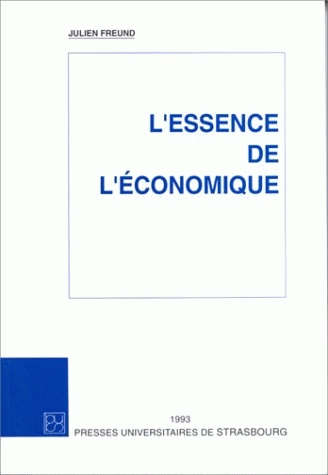 P.B. - L'hybris des Grecs était étroitement normée par le religieux. Comme le carnaval médiéval annonçant quarante jours de carême. Après avoir couru la forêt plusieurs jours durant, la ménade dionysiaque regagne sagement son foyer. Le désordre n'est qu'une brève séquence vécue collectivement sous le contrôle du divin. Il agit comme une cure salvatrice où se décharge la part maudite. Il en va de même pour le carnaval qui ne promeut la subversion que pour renforcer l'ordre social. Il est ce moment de chaos, inscrit dans le comput et rejoué chaque année durant la saison morte et il prélude à une rigoureuse recréation du lien hiérarchique. Dans un cas comme dans l'autre, l'excès a pour but la restauration, c'est-à-dire l'éternel retour de l'ordre. Comme le montre Baudrillard, la société traditionnelle raffermit ses principes en traitant le mal par le mal. A cette stratégie ironique Baudrillard oppose celle, piteuse, de nos modernes, ces héros d'un sublime toujours voué à l'échec, car ils ne veulent braver le mal que par l'usage du Bien. C'est cette antique faculté de rénovation du social que le moralisme nous a fait perdre. Car l'harmonie, toujours relative, exige que l'on bride aussi bien le mal inévitable que l'exigence morale. L'arrogance du Bien est cause des plus grands maux. L'hybris individuel de masse défait la société pour bénir le marché. Mais qu'est-ce qu'un marché sans substruction sociale ? Le marché sans les entraves du lien, c'est le chaos.
P.B. - L'hybris des Grecs était étroitement normée par le religieux. Comme le carnaval médiéval annonçant quarante jours de carême. Après avoir couru la forêt plusieurs jours durant, la ménade dionysiaque regagne sagement son foyer. Le désordre n'est qu'une brève séquence vécue collectivement sous le contrôle du divin. Il agit comme une cure salvatrice où se décharge la part maudite. Il en va de même pour le carnaval qui ne promeut la subversion que pour renforcer l'ordre social. Il est ce moment de chaos, inscrit dans le comput et rejoué chaque année durant la saison morte et il prélude à une rigoureuse recréation du lien hiérarchique. Dans un cas comme dans l'autre, l'excès a pour but la restauration, c'est-à-dire l'éternel retour de l'ordre. Comme le montre Baudrillard, la société traditionnelle raffermit ses principes en traitant le mal par le mal. A cette stratégie ironique Baudrillard oppose celle, piteuse, de nos modernes, ces héros d'un sublime toujours voué à l'échec, car ils ne veulent braver le mal que par l'usage du Bien. C'est cette antique faculté de rénovation du social que le moralisme nous a fait perdre. Car l'harmonie, toujours relative, exige que l'on bride aussi bien le mal inévitable que l'exigence morale. L'arrogance du Bien est cause des plus grands maux. L'hybris individuel de masse défait la société pour bénir le marché. Mais qu'est-ce qu'un marché sans substruction sociale ? Le marché sans les entraves du lien, c'est le chaos.
J.F. - Avec les années, votre critique du libéralisme s'est sans cesse accentuée. A ses débuts, la nouvelle droite était bien moins radicale. J'ai conservé d'ailleurs certains textes de cette époque ; vous ne pourriez plus vous y reconnaître. Je songe à ces odes à l'homme faustien dont vous étiez coutumiers ; toute cette quincaillerie qui fonde la supériorité de la culture européenne sur ses seules aptitudes scientifiques et techniques. L'arraisonnement du monde dont nous sommes évidemment les champions est un mécanisme équivoque qui révèle aujourd'hui toute son ambivalence. La logique économique s'empare de la planète, comme l'avait annoncé Spengler, mais ses effets sont pour l'Europe probablement mortifères. Vous ne croyez plus à cette supériorité en trompe-l'oeil... Vous ne communiez plus dans le dithyrambe faustien.
P.B. - Je ne récuserai pas le risque d'un pacte avec le malin, mais je suis mécréant et je ne crois ni à dieu ni à diable... Cependant, vous avez raison : nos paradigmes ont évolué au fur et à mesure que - j'espère le dire sans forfanterie - que notre réflexion s'approfondissait. Par exemple, je ne pourrais plus parler de supériorité intrinsèque de l'Europe. Un tel jugement n'est concevable que dans une perspective universaliste. Pour que les hiérarchies fassent sens, il faut bien que les valeurs qui permettent de les établir soient unanimement partagées. Or, les valeurs étant l'expression de cultures différentes, toute tentative de classement trahit un ethnocentrisme effronté. Ce que l'on baptise pompeusement l'universel, qu'est-ce donc d'autre, sinon la culture et les préjugés des conquérants ?
J.F. - Vous êtes relativiste !
P.B. - J'incline à penser que l'écart entre les cultures ne relève pas d'une différence de degré, mais d'une distinction de nature, même si, bien entendu, il n'y a qu'une seule espèce humaine. D'où ma réserve, pour ne pas dire plus, vis à vis de cette arrogance occidentale qui pulvérise le pluriversum planétaire avec, il faut bien le dire, la complicité extasiée de la plupart de ses victimes. Ultimes sectateurs de cette occidentalisation, les croisés des droits-de-l'homme ne sont pas ses thuriféraires les plus naïfs. Le moralisme chevillé au corps, ils couronnent un processus qui n'a fait que s'accentuer pour le plus grand malheur de l'humanité. Car, enfin, concrètement, ce qu'on appelle prétentieusement le développement, qu'est-ce d'autre que la métamorphose de la pauvreté en misère. Qu'est-ce donc que la misère ? C'est la pauvreté sans le secours apaisant du groupe, sans les racines partagées, sans l'assurance d'un entre-soi solidaire.
J.F. - Nous parlions du libéralisme.
P.B. - Pour ce qui concerne la critique du libéralisme, il y a des rapprochements terriblement éloquents. Au nom de la concurrence et de la rentabilité du capital, on exige une flexibilité toujours plus grande des acteurs économiques. La mobilité, le nomadisme sont devenus des facteurs déterminants de la réussite et du même coup des signes de la distinction dans les élites. Si je reprends l'exemple de la famille devenue cette institution fragile et mouvante dont nous parlions tout à l'heure, il est évident que sa forme classique marquée par la stabilité est aujourd'hui perçue comme une rigidité incompatible avec les nouvelles contraintes du salariat. La loi du capital mondialisé et de la compétition sans frontière, c'est l'entière disponibilité des agents aux exigences de l'entreprise. Il faut accepter la logique des flux ou périr. Le schéma idéologique qui justifie l'adaptabilité dans les relations de travail donne également raison à la mobilité affective qui déstructure la cellule familiale et sacrifie l'éducation des enfants. Plus s'affirme l'hégémonie libérale, plus ses valeurs tendent à instrumenter les individus et à irriguer le tissu social, et plus l'on voit les bases les plus élémentaires de " la vie bonne " se déliter.
J.F. - Il y a une confusion fallacieuse entre capitalisme et libéralisme. Une confusion récente, puisque à la fin du XIXème siècle encore, Leroy-Beaulieu s'élevait contre cet amalgame. Je réfléchis à cela pour mon prochain livre sur l'essence de l'économique.Je vous ai souvent cité ces passages de Marx dans lesquels il glorifie les capacités révolutionnaires du développement capitaliste...la profanation du vieux monde à laquelle il se livre. La logique du capitalisme est en effet destructrice et créatrice. Comme Marx le souligne toujours, il bouscule les structures sociales et les mentalités qui font obstacle à son déploiement. Marx se réjouissait de ce maelström continuel, car il y voyait les prémisses de la révolution à venir, mais il ne soupçonnait pas l'aptitude du système à triompher de ses contradictions en se renouvelant au gré des oppositions rencontrées. Cette aptitude à la régénération plaide d'ailleurs pour lui ; mieux que les systèmes rivaux, il a su capter certaines constantes de la nature humaine afin de s'en fortifier. Ceci étant dit, on voit bien que l'économie, aujourd'hui, excède sa vocation et tend à annexer ou à dissoudre des activités dont l'existence et l'autonomie sont nécessaires à l'équilibre de la cité. De toute évidence, les soubassements de la vie collective, à commencer par l'identité culturelle, sont mis en péril par les tourbillons que provoque son déchaînement contemporain. Il y a là une violence économique qui infirme le préjugé de Montesquieu et de sa descendance libérale sur les vertus pacifiantes du doux commerce.
P.B. - Les libéraux répondent à cela que l'abondance et la paix surviendront effectivement lorsque le marché aura triomphé des pesanteurs - traduire : les vestiges encore agissant de l'ancien monde - et des trop tenaces préjugés de ses adversaires. En clair, lorsqu'il sera venu à bout de la nature humaine. Ce plaidoyer est une théodicée. Comment en effet se persuader de l'excellence du système compte tenu des maux qui semblent la démentir ? En interprétant ces maux comme autant d'épreuves à surmonter avant la rédemption promise. C'est un discours comparable à celui des marxistes pur sucre selon lesquels le socialisme réellement existant n'est qu'une caricature de leur mirifique utopie. Jamais la vérité du dogme n'est mise en cause. En revanche, on invoque la figure perturbatrice du mal - par exemple, les structures agraires de la Russie de 1917, l'empreinte orthodoxe dans les mentalités, la paranoïa de Staline... Autant d'accidents historiques passibles d'une remédiation. N'oublions pas que pour les trotskistes, l'U.R.S.S. demeure, malgré tout, un Etat prolétarien. Ces modes de raisonnement sont caractéristiques d'une dérive magique de l'entendement. Une pensée close qui entend contraindre le réel par des formules rituelles. Le sorcier qui ne parvient pas à faire tomber la pluie a toujours une explication. Une formule, une incantation, une puissance, supérieures et contraires aux siennes, se sont interposées entre son savoir-faire et les phénomènes qu'il prétend régenter. Grâce au mauvais génie, la raison magique n'est jamais prise au dépourvu. Au contraire même, ses échecs la renforcent. L'implosion annoncée du communisme et le déclin, sinon la ruine, des espérances sécularisées, qui sont en soi une excellente nouvelle, livrent l'espace planétaire à un libéralisme de plus en plus débridé. Par défaut d'adversaire, le voilà abandonné à sa propre ivresse. Le monopole n'incite pas à la prudence. Face à son empire ne demeurent plus que des ethno-résistances désarticulées et qui, par définition, ne peuvent pas constituer un front commun.
J.F. - La France et l'Europe ne semblent pas devoir subir ce monopole impérieux. Les régimes mixtes qui combinent aspirations libérales et aspirations social-démocrates y sont solidement enracinés et le libéralisme, dont l'influence s'accroît effectivement, y paraît très édulcoré.
P.B. - Deux aspirations qui ont ceci en commun d'être issues de la matrice des Lumières et de surestimer le rôle de l'économie au point de toujours privilégier la croissance comme un sésame en dépit des ravages qu'elle exerce aussi bien sur la biosphère que dans la sociosphère. Il s'agit de deux inflexions d'un même système, comme vous l'avez d'ailleurs écrit à plusieurs reprises. A tour de rôle, chacun de ces deux sous-systèmes est mis en avant pour corriger les excès de l'autre, mais on ne met jamais en question la matrice commune et ses paradigmes. C'est pourquoi les frères ennemis jouissent d'un bail emphytéotique sur ce qui nous reste de vie politique.
J.F. - C'est ce qui conduit Alain de Benoist à relativiser la pertinence du clivage gauche-droite.
P.B. - Oui, c'est un clivage obsolescent quant au fond, un simple label pour identifier des commissions de gestionnaires rivaux ; mais les élites dépensent des trésors de communication pour le maintenir sous perfusion. Il y va de leur intérêt.Cette hégémonie n'est même pas sérieusement contestée par les chapelles d'extrême-gauche dont la présence très active dans ce qu'un de vos collègues appelle les nouveaux mouvements sociaux, prend pour cible privilégiée la famille, l'armée, la religion, l'école autoritaire, etc... Autant de proies chétives, d'objectifs cacochymes, de leurres, que l'évaluation libérale-libertaire du capitalisme s'est depuis longtemps employée à déconsidérer et dont les vestiges, objets de railleries consensuelles, ne peuvent plus être considérés comme des forces agissantes et, à fortiori, comme des instruments d'oppression. En blasphémant des idoles déchues, ils participent de cette " insignifiance " dont parle Castoriadis pour qualifier ce présent où nous avons à vivre.
J.F. - Mon cher Bérard ; nous allons finir cette bouteille, il faut sustenter cette péroraison...
Julien Freund arbore un large sourire.
P.B. - C'est un fait, la clameur " contestataire " enfle au rythme où s'épuise son imaginaire révolutionnaire. On notera par ailleurs que cette clameur trouve un écho complice dans ce qu'il faut bien appeler la presse " patronale ", ce qui est tout dire de la capacité subversive que lui reconnaissent les classes dirigeantes.En vociférant contre les vestiges de l'ancienne société, la dissidence de confort apporte sa modeste contribution à l'entreprise de bazardement qui doit faire place nette aux stratégies de recomposition d'un capitalisme mondialisé. Leurs diatribes contre la France frileuse, le repli identitaire, le tribalisme xénophobe... c'est cela : la version jeuniste, lyrique et bigarrée d'une raison libérale qui a fait le choix de la globalisation et considère, en conséquence, les frontières comme des obstacles à effacer. Favoriser la porosité des territoires pour que demeure seulement un espace homogène de consommation. Le monde sans frontière dont rêvent les gauchistes ressemble furieusement à un terrain de jeu pour multinationales en goguette.
J.F. - Vous dites " en goguette " et moi j'entends " en maraude ".
P.B. - Monsieur le Professeur... C'est que vous avez l'ouïe trop perçante... Le libre-échange intégral exige l'abolition des limites et il s'accommode de plus en plus difficilement d'un monde hérissé de différences. Sa logique, c'est le lisse, l'homogène, le transparent. Le cosmopolitisme est devenu son cri de guerre publicitaire. Ce cosmopolitisme frivole et marchand dont on nous abreuve en escomptant que notre ignorance nous fera confondre le rappeur de banlieue avec l'intellectuel juif viennois qui, il y a un siècle, s'exprimait avec préciosité en trois ou quatre langues sans compter le latin et le grec et s'abreuvait à deux ou trois cultures dont il maîtrisait toutes les subtilités...
J.F. - Vous savez ce qu'est la " world music " ?
P.B. - Pillage et plagiat. Une louche de samba, une cuillerée de rock, une pincée de tam-tam africain, le tout synthétisé par les ingénieurs des multinationales du divertissement et promu sous le label irréprochable de l'antiracisme.
J.F. - Vous avez remarqué, comme on n'entend plus ni Brel, ni Brassens à la radio ? Pour moi, le cosmopolitisme, ce sont les humanistes de la Renaissance, les aristocraties de cours du XVIIIème siècle, Voltaire plaisantant avec le roi de Prusse, ou ces artistes juifs de la Mittel-Europa dont vous parlez. C'est un apprentissage exigeant à l'opposé de ce laisser-aller qui s'exprime en " broken-english " et qu'on fabrique effectivement pour des consommateurs déracinés et pressés. Comme tous les démocratismes, la démocratisation du cosmopolitisme est une duperie. Ceux qui prônent le cosmopolitisme de masse sont en fait allergiques à la diversité. C'est Paul Morand qui écrivait avant-guerre : " La vitesse tue la couleur ; le gyroscope quand il tourne vite fait du gris ".
P.B. - Pour en conclure avec les gauchistes, je voudrais dire un mot sur ce que des détracteurs trop frivoles appellent leur opportunisme. Assurément, nombre d'entre eux se sont " ralliés " au système qu'ils croyaient combattre. Beaucoup font " carrière " dans la publicité, le journalisme et les appareils. On les découvre au sommet des " partis de gouvernement ", des syndicats et même du C.N.P.F. Il y a comme un gauchisme d'Etat et beaucoup se gaussent de ces itinéraires. Pourtant, je ne parlerai pas d'apostasie, mais plutôt d'une vocation aboutie. L'hypothèse de la palinodie n'est en effet recevable qu'à deux conditions. D'abord, considérer que la polarité gauche-droite permet de rendre compte de toutes les opinions. Ensuite, rattacher le libéralisme à la droite historique. Or, aucune de ces deux conditions n'est réalisée. A partir du moment où l'on veut bien s'extraire de ce double carcan, les soi-disants revirements prennent une autre coloration. Mon interprétation, c'est que les gauchistes recyclés dans les principaux organes de propagande du système n'ont pas trahi leurs idéaux de jeunesse mais manifestent, enfin, avec éclat, l'impensé que charrie depuis toujours leur conception du monde. Leur succès métapolitique, leur capacité à fournir le système dominant en cadres efficaces, la propension des classes dirigeantes à les accueillir en leur sein, sont autant d'épreuves de vérité quant à la nature réelle du libéralisme contemporain et quant aux concepts que le gauchisme véhicule.
J.F. - Toujours la vérification ironique.
P.B. - En effet, il n'y a pas de convergence innocente. Libre circulation des capitaux et des marchandises, libre circulation de la force de travail renvoient au même imaginaire.La mondialisation capitaliste est conviée à recycler indéfiniment, à son profit, les déchets d'un internationalisme décrépit. C'est dans la grammaire libérale que doivent désormais s'interpréter les anciennes revendications internationalistes du prolétariat. Quant aux prolétaires réellement existants, dont les experts de connivence se plaisent à souligner la disparition, ils devront s'arranger avec un monde qui reprend d'autant plus volontiers leurs anciens mots d'ordre qu'il les sacrifie à l'avenir radieux de la marchandise;
J.F. - Il se fait tard, nous allons rentrer boire un schnapps ...
P.B. - Une dernière chose... Il faut y insister. Les crypto-repentis ont fait don à l'oligarchie d'un inestimable présent, le verrou qui scelle toutes les volontés transgressives... Cet antifascisme concocté jadis dans le chaudron stalinien, ragaillardi par son alliage tout neuf avec la religion des droits de l'homme. Commence l'âge du virtuel et nous voici surplombé par le surmoi antifasciste qui impose à tous effroi et tremblements. Pour les authentiques opposants, le choix, c'est le silence des proscrits ou la médiatisation fatale réservés aux épouvantails.
J.F. - Cette convergence, est-ce le retour à la matrice d'origine ? Ce serait un signe d'épuisement, le symptôme d'une saturation. L'idée est à creuser. Il se pourrait que les Lumières aient accouché de toutes leurs potentialités, d'où la crispation de l'agonisant.
P.B. - Oui... le stade sénile et sombre des lumières. La loi Le Chapelier pactisant avec la loi des suspects ; 1791 définitivement réconcilié avec 1793.
J.F. - La seule morale d'un monde sans morale...Mais ne cultivons pas ce pessimisme qui est l'échappatoire des avortons ou l'alibi de la paresse. La messe n'est jamais dite, et beaucoup de tâches nous requièrent.
Généralement, nos rencontres se terminent dans le salon de Julien Freund. Une grande pièce décorée de toiles de son beau-père, le peintre René Kuder. La conversation s'y poursuit autour d'un verre de cet alcool blanc dont le val de Villé cultive depuis des siècles le savoir-faire. Souvent, nous parlons de ces étudiants que je lui ai présentés et auxquels régulièrement il fait don de son savoir et de ses analyses. Sa disponibilité est entière, mais son jugement féroce. Volonté de transmettre, refus d'abdiquer, Freund est un stoïque romain, campé sur le limes du combat intellectuel. Il est bien tard quand je reprends ma voiture. Il est sur son perron. Son regard m'enveloppe de recommandations paternelles.
J.F. - N'oubliez pas de transmettre mon amitié à Alain de Benoist !
Demain, je téléphonerai à Fabrice pour lui donner des nouvelles de notre Julien Freund.
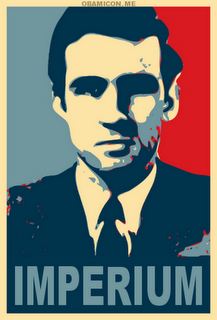 Well, not quite. Tate, whose attitude toward Spengler is generally approving, seems to be straining at a gnat here. The answer to his question is that individual action and “organic determinism” can and do coexist. They do not contradict each other. Denizens of a high culture do not turn into a herd of mindless cattle simply because some force majeure is in operation.
Well, not quite. Tate, whose attitude toward Spengler is generally approving, seems to be straining at a gnat here. The answer to his question is that individual action and “organic determinism” can and do coexist. They do not contradict each other. Denizens of a high culture do not turn into a herd of mindless cattle simply because some force majeure is in operation.


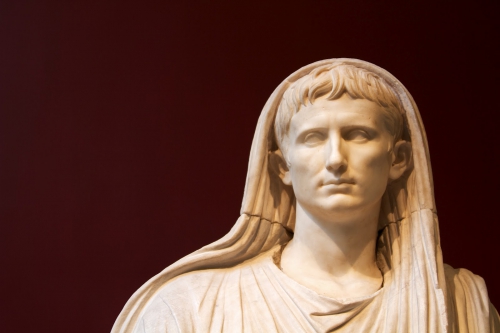

 del.icio.us
del.icio.us
 Digg
Digg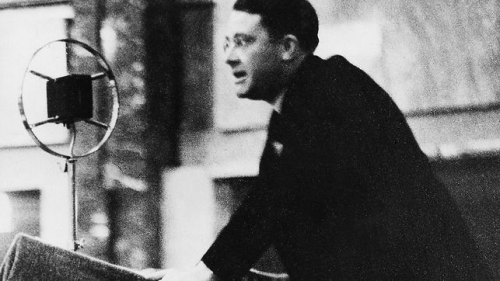


 Dans la seconde moitié du XXe siècle, les sociétés démocratiques ont franchi une nouvelle étape de leur histoire, marquée à la fois par le développement de la production, de la consommation et, dans le dernier quart du siècle, par les « désillusions du progrès
Dans la seconde moitié du XXe siècle, les sociétés démocratiques ont franchi une nouvelle étape de leur histoire, marquée à la fois par le développement de la production, de la consommation et, dans le dernier quart du siècle, par les « désillusions du progrès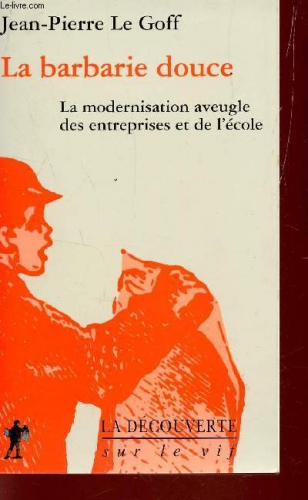 La fuite en avant moderniste s’étend également aux mentalités et aux modes de vie emportés dans un changement perpétuel, sans finalité autre que celles de la survie et de la concurrence dans un monde chaotique. Si le monde et notre héritage culturel ne sont pas immuables, on ne saurait faire valoir comme modèle a contrario un mouvement permanent, indéfini, et un multiculturalisme invertébré, à moins de considérer que notre faculté de penser et de juger est désormais hors de propos. C’est précisément ces idées que diffusent les rhéteurs de la postmodernité qui commentent indéfiniment les évolutions et veulent à tout prix apparaître dans le camp d’un « progrès » devenu synonyme de « changement » sans but ni sens. Pour une partie des élites, l’important c’est d’« en être », en faisant du surf sur les évolutions et en essayant de tirer parti d’une telle situation. Face à cette insignifiance, les questions fondamentales : « Qu’est-ce qui est vrai ? », « Qu’est-ce qui est juste ? », « Qu’est-ce que je peux en penser ? » sont devenues des exigence à la fois conservatrices et très actuelles, à l’heure d’une « réactivité » et d’un zapping permanent qui ne permettent plus la distance et brouillent le discernement.
La fuite en avant moderniste s’étend également aux mentalités et aux modes de vie emportés dans un changement perpétuel, sans finalité autre que celles de la survie et de la concurrence dans un monde chaotique. Si le monde et notre héritage culturel ne sont pas immuables, on ne saurait faire valoir comme modèle a contrario un mouvement permanent, indéfini, et un multiculturalisme invertébré, à moins de considérer que notre faculté de penser et de juger est désormais hors de propos. C’est précisément ces idées que diffusent les rhéteurs de la postmodernité qui commentent indéfiniment les évolutions et veulent à tout prix apparaître dans le camp d’un « progrès » devenu synonyme de « changement » sans but ni sens. Pour une partie des élites, l’important c’est d’« en être », en faisant du surf sur les évolutions et en essayant de tirer parti d’une telle situation. Face à cette insignifiance, les questions fondamentales : « Qu’est-ce qui est vrai ? », « Qu’est-ce qui est juste ? », « Qu’est-ce que je peux en penser ? » sont devenues des exigence à la fois conservatrices et très actuelles, à l’heure d’une « réactivité » et d’un zapping permanent qui ne permettent plus la distance et brouillent le discernement.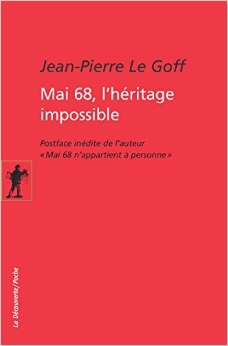 Les origines, le contenu et la genèse de ce gauchisme sont inséparables du basculement opéré par le mouvement de mai 68. En France, cet événement multiforme marque un moment de pause et de catharsis dans une société qui, depuis la fin de la Seconde Guerre mondiale, s’est trouvée transformée en peu de temps par la modernisation des Trente glorieuses
Les origines, le contenu et la genèse de ce gauchisme sont inséparables du basculement opéré par le mouvement de mai 68. En France, cet événement multiforme marque un moment de pause et de catharsis dans une société qui, depuis la fin de la Seconde Guerre mondiale, s’est trouvée transformée en peu de temps par la modernisation des Trente glorieuses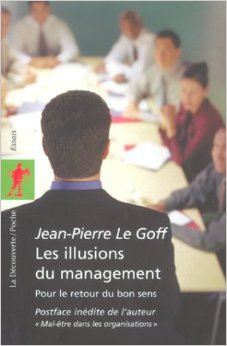 L’économie de marché a ses lois propres, mais elle s’insère aussi dans un creuset anthropologique et historique. L’économisme dominant passe outre cette dimension essentielle à la vie en société et à la politique. Un pays n’est pas une entreprise et la culture n’est pas une sorte de « pâte à modeler » ou de « supplément d’âme » à une société conçue comme une mécanique gérable et adaptable à volonté ; elle est précisément ce qui donne sens à la vie en société.
L’économie de marché a ses lois propres, mais elle s’insère aussi dans un creuset anthropologique et historique. L’économisme dominant passe outre cette dimension essentielle à la vie en société et à la politique. Un pays n’est pas une entreprise et la culture n’est pas une sorte de « pâte à modeler » ou de « supplément d’âme » à une société conçue comme une mécanique gérable et adaptable à volonté ; elle est précisément ce qui donne sens à la vie en société.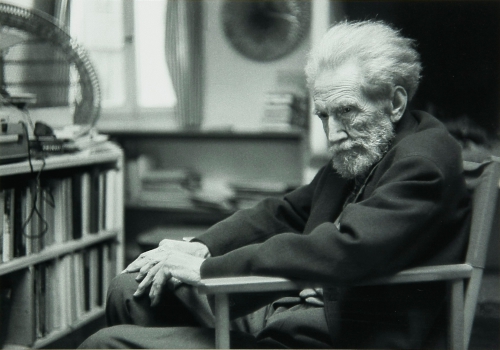
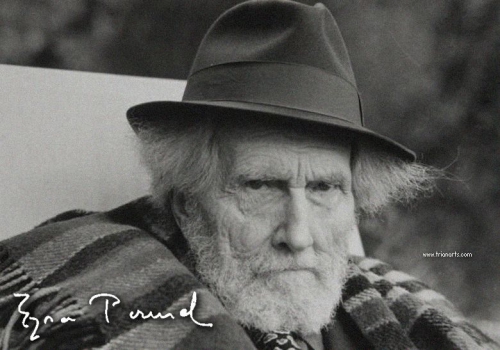
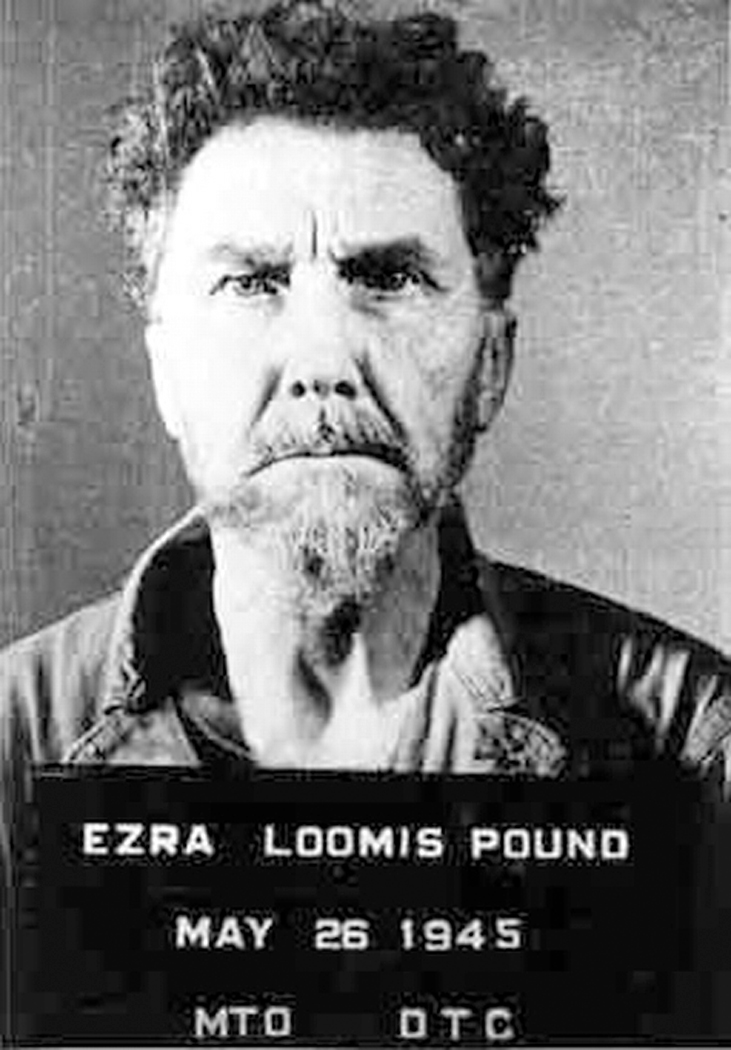
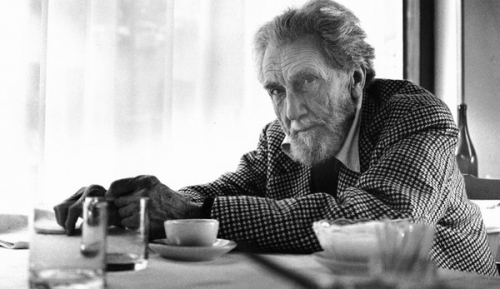
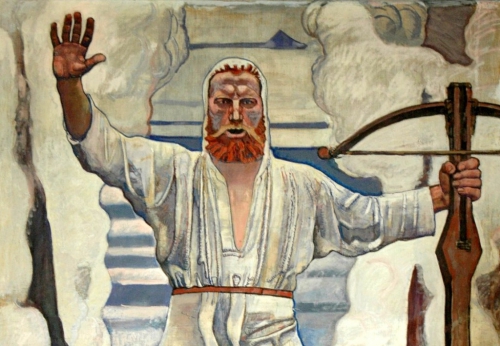
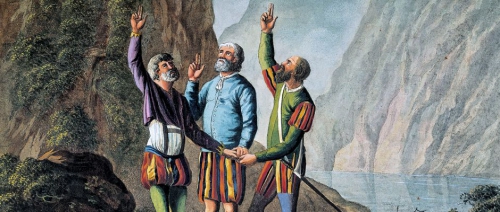

 Julien Freund est mort en septembre 1993. De la fin des années 70 jusqu'à son décès, je l'ai rencontré à maintes reprises tant à Strasbourg que chez lui à Villé et dans ces villes d'Europe où nous réunissaient colloques et conférences. Des heures durant j'ai frotté à sa patience et à sa perspicacité les grands thèmes de la Nouvelle Droite. Il les accueillait souvent avec une complicité rieuse, parfois avec scepticisme, toujours avec la franche indépendance d'esprit qui a marqué toute son existence. Les lignes qui suivent mettent en scène des conversations tenues à la fin des années quatre-vingt. Des notes prises alors sur le vif et des souvenirs demeurés fort intenses m'ont permis de reconstituer par bribe certains de ces moments. Bien entendu, il ne s'agit pas d'utiliser ici le biais de la fiction posthume pour prêter à Julien Freund des propos que les calomniateurs dont on connaît l'acharnement pourraient instrumenter contre la mémoire d'un grand maître. C'est pourquoi j'entends assumer l'entière responsabilité de ce dialogue. Lors de ces entrevues, on le devine, l'ami absent mais souvent évoqué était Alain de Benoist. Ce texte lui est dédié.
Julien Freund est mort en septembre 1993. De la fin des années 70 jusqu'à son décès, je l'ai rencontré à maintes reprises tant à Strasbourg que chez lui à Villé et dans ces villes d'Europe où nous réunissaient colloques et conférences. Des heures durant j'ai frotté à sa patience et à sa perspicacité les grands thèmes de la Nouvelle Droite. Il les accueillait souvent avec une complicité rieuse, parfois avec scepticisme, toujours avec la franche indépendance d'esprit qui a marqué toute son existence. Les lignes qui suivent mettent en scène des conversations tenues à la fin des années quatre-vingt. Des notes prises alors sur le vif et des souvenirs demeurés fort intenses m'ont permis de reconstituer par bribe certains de ces moments. Bien entendu, il ne s'agit pas d'utiliser ici le biais de la fiction posthume pour prêter à Julien Freund des propos que les calomniateurs dont on connaît l'acharnement pourraient instrumenter contre la mémoire d'un grand maître. C'est pourquoi j'entends assumer l'entière responsabilité de ce dialogue. Lors de ces entrevues, on le devine, l'ami absent mais souvent évoqué était Alain de Benoist. Ce texte lui est dédié. En réponse à ces immenses défis, je suis frappé par le caractère routinier du débat européen. L'Europe se construit d'une manière fonctionnaliste, par une suite d'enchaînements automatiques. Son fétichisme institutionnel permet de dissimuler notre maladie qui est l'absence d'objectifs affichés. Nous sommes par exemple impuissants à nous situer par rapport au monde. Etrange narcissisme ; on se congratule d'exister, mais on ne sait ni se définir, ni se circonscrire. L'Europe est-elle reliée à un héritage spécifique ou bien se conçoit-elle comme une pure idéalité universelle, un marchepied vers l'Etat mondial ? L'énigme demeure avec un penchant de plus en plus affirmé pour la seconde solution qui équivaudrait à une dissolution. Ce processus se nourrit par ailleurs, c'est transparent chez les Allemands, d'une propension à fuir le passé national et se racheter dans un sujet politique plus digne d'estime, une politie immaculée, sans contact avec les souillures de l'histoire. Cette quête de l'innocence, cet idéalisme pénitentiel qui caractérisent notre époque se renforcent au rythme que lui imposent les progrès de cette mémoire négative toute chargée des fautes du passé national. On veut lustrer une Europe nouvelle par les vertus de l'amnésie. Par le baptême du droit on veut faire un nouveau sujet. Mais ce sujet off-shore n'est ni historique, ni politique. Autant dire qu'il n'est rien d'autre qu'une dangereuse illusion. En soldant son passé, l'Europe s'adosse bien davantage à des négations qu'à des fondations. Conçue sur cette base, l'Europe ne peut avoir ni objectif, ni ambition et surtout elle ne peut plus rallier que des consentements velléitaires. Le nouvel Européen qu'on nous fabrique est une baudruche aux semelles de vent. Les identités fluides, éphémères qu'analyse Michel Maffesoli ne peuvent en aucun cas tenir le rôle des identités héritées. Elles n'agrègent que de manière ponctuelle et transitoire, en fonction de modes passagères. Oui, ce ne sont que des agrégats instables stimulés par le discours publicitaire. L'orgiasme n'est pas une réponse au retrait du politique, car il exclut la présence de l'ennemi. Quand il se manifeste, l'ennemi, lui, ne s'adonne pas au ludisme dionysiaque. Si le politique baisse la garde, il y aura toujours un ennemi pour troubler notre sommeil et déranger nos rêves. Il n'y a qu'un pas de la fête à la défaite. Ces tribus là ne sont pas un défi à l'individualisme, elles en sont l'accomplissement chamarré...
En réponse à ces immenses défis, je suis frappé par le caractère routinier du débat européen. L'Europe se construit d'une manière fonctionnaliste, par une suite d'enchaînements automatiques. Son fétichisme institutionnel permet de dissimuler notre maladie qui est l'absence d'objectifs affichés. Nous sommes par exemple impuissants à nous situer par rapport au monde. Etrange narcissisme ; on se congratule d'exister, mais on ne sait ni se définir, ni se circonscrire. L'Europe est-elle reliée à un héritage spécifique ou bien se conçoit-elle comme une pure idéalité universelle, un marchepied vers l'Etat mondial ? L'énigme demeure avec un penchant de plus en plus affirmé pour la seconde solution qui équivaudrait à une dissolution. Ce processus se nourrit par ailleurs, c'est transparent chez les Allemands, d'une propension à fuir le passé national et se racheter dans un sujet politique plus digne d'estime, une politie immaculée, sans contact avec les souillures de l'histoire. Cette quête de l'innocence, cet idéalisme pénitentiel qui caractérisent notre époque se renforcent au rythme que lui imposent les progrès de cette mémoire négative toute chargée des fautes du passé national. On veut lustrer une Europe nouvelle par les vertus de l'amnésie. Par le baptême du droit on veut faire un nouveau sujet. Mais ce sujet off-shore n'est ni historique, ni politique. Autant dire qu'il n'est rien d'autre qu'une dangereuse illusion. En soldant son passé, l'Europe s'adosse bien davantage à des négations qu'à des fondations. Conçue sur cette base, l'Europe ne peut avoir ni objectif, ni ambition et surtout elle ne peut plus rallier que des consentements velléitaires. Le nouvel Européen qu'on nous fabrique est une baudruche aux semelles de vent. Les identités fluides, éphémères qu'analyse Michel Maffesoli ne peuvent en aucun cas tenir le rôle des identités héritées. Elles n'agrègent que de manière ponctuelle et transitoire, en fonction de modes passagères. Oui, ce ne sont que des agrégats instables stimulés par le discours publicitaire. L'orgiasme n'est pas une réponse au retrait du politique, car il exclut la présence de l'ennemi. Quand il se manifeste, l'ennemi, lui, ne s'adonne pas au ludisme dionysiaque. Si le politique baisse la garde, il y aura toujours un ennemi pour troubler notre sommeil et déranger nos rêves. Il n'y a qu'un pas de la fête à la défaite. Ces tribus là ne sont pas un défi à l'individualisme, elles en sont l'accomplissement chamarré... P.B. - Alors comme souvent, quand l'omerta n'est plus tenable, ils déblatèrent.
P.B. - Alors comme souvent, quand l'omerta n'est plus tenable, ils déblatèrent. P.B. - C'est Nietzsche qui écrit dans La volonté de puissance que l'Europe malade trouve un soulagement dans la calomnie. Mais il se pourrait bien que le masochisme européen ne soit qu'une ruse de l'orgueil occidental. Blâmer sa propre histoire, fustiger son identité, c'est encore affirmer sa supériorité dans le Bien. Jadis l'occidental assurait sa superbe au nom de son dieu ou au nom du progrès. Aujourd'hui il veut faire honte aux autres de leur fermeture, de leur intégrisme, de leur enracinement coupable et il exhibe sa contrition insolente comme preuve de sa bonne foi. Ce ne serait pas seulement la fatigue d'être soi que trahirait ce nihilisme contempteur mais plus certainement la volonté de demeurer le précepteur de l'humanité en payant d'abord de sa personne. Demeurer toujours exemplaire, s'affirmer comme l'unique producteur des normes, tel est son atavisme. Cette mélodie du métissage qu'il entonne incessamment, ce ne serait pas tant une complainte exténuée qu'un péan héroïque. La preuve ultime de sa supériorité quand, en effet, partout ailleurs, les autres érigent des barrières et renforcent les clôtures. L'occidental, lui, s'ouvre, se mélange, s'hybride dans l'euphorie et en tire l'argument de son règne sur ceux qui restent rivés à l'idolâtrie des origines. Ce ne serait ni par abnégation, ni même par résignation qu'il précipiterait sa propre déchéance mais pour se confondre enfin intégralement avec ce concept d'humanité qui a toujours été le motif privilégié de sa domination... Il y a beaucoup de cabotinage dans cet altruisme dévergondé et dominateur et c'est pourquoi le monde du spectacle y tient le premier rôle...
P.B. - C'est Nietzsche qui écrit dans La volonté de puissance que l'Europe malade trouve un soulagement dans la calomnie. Mais il se pourrait bien que le masochisme européen ne soit qu'une ruse de l'orgueil occidental. Blâmer sa propre histoire, fustiger son identité, c'est encore affirmer sa supériorité dans le Bien. Jadis l'occidental assurait sa superbe au nom de son dieu ou au nom du progrès. Aujourd'hui il veut faire honte aux autres de leur fermeture, de leur intégrisme, de leur enracinement coupable et il exhibe sa contrition insolente comme preuve de sa bonne foi. Ce ne serait pas seulement la fatigue d'être soi que trahirait ce nihilisme contempteur mais plus certainement la volonté de demeurer le précepteur de l'humanité en payant d'abord de sa personne. Demeurer toujours exemplaire, s'affirmer comme l'unique producteur des normes, tel est son atavisme. Cette mélodie du métissage qu'il entonne incessamment, ce ne serait pas tant une complainte exténuée qu'un péan héroïque. La preuve ultime de sa supériorité quand, en effet, partout ailleurs, les autres érigent des barrières et renforcent les clôtures. L'occidental, lui, s'ouvre, se mélange, s'hybride dans l'euphorie et en tire l'argument de son règne sur ceux qui restent rivés à l'idolâtrie des origines. Ce ne serait ni par abnégation, ni même par résignation qu'il précipiterait sa propre déchéance mais pour se confondre enfin intégralement avec ce concept d'humanité qui a toujours été le motif privilégié de sa domination... Il y a beaucoup de cabotinage dans cet altruisme dévergondé et dominateur et c'est pourquoi le monde du spectacle y tient le premier rôle... Julien Freund s'amuse de cette interpellation surannée. Jamais, cependant, malgré des années de complicité, je ne me suis départi à son égard de ces antiques politesses.
Julien Freund s'amuse de cette interpellation surannée. Jamais, cependant, malgré des années de complicité, je ne me suis départi à son égard de ces antiques politesses. Julien Freund rit longuement, ressert une rasade de pinot noir et s'offre un excursus pointu sur l'origine des différents cépages alsaciens. Et, comme toujours lorsque la conversation prend ce tour grave qui sied au plaisir du boire et du manger, il surligne d'un index didactique ses propos les plus définitifs. Nous buvons...
Julien Freund rit longuement, ressert une rasade de pinot noir et s'offre un excursus pointu sur l'origine des différents cépages alsaciens. Et, comme toujours lorsque la conversation prend ce tour grave qui sied au plaisir du boire et du manger, il surligne d'un index didactique ses propos les plus définitifs. Nous buvons... La mémoire livresque de Julien Freund est surprenante. Il détient dans ses réserves des milliers d'extraits, parfois très longs. Il en émaille sa conversation savante avec le souci constant de rembourser sa dette vis à vis de grands textes. L'art de la citation est toujours chez lui un exercice d'humilité, une manière de reconnaître que beaucoup d'autres ont inscrit leur empreinte dans sa propre pensée. C'est dire tout ce qui le distingue de l'enflure pédante de ces clercs qui abritent leur arrogance derrière le rempart des signatures prestigieuses. Julien Freund, lui, ne cède pas au goût du décor ; il fait vibrer la pensée des Anciens et, c'est toujours amarré à ces références patiemment ruminées qu'il affronte les problématiques du présent. Car, en effet, il rumine, triture et mâchonne comme le conseillait Nietzsche. Lenteur délibérée de la méditation ; tempo ralenti d'une pensée qui se construit par sédimentation et élagage ; discipline de la prudence, exercice du doute probatoire... Tout un univers qui fait contraste avec l'impulsion qui étend partout son empire au nom d'une authenticité factice et d'urgences fantasmatiques.
La mémoire livresque de Julien Freund est surprenante. Il détient dans ses réserves des milliers d'extraits, parfois très longs. Il en émaille sa conversation savante avec le souci constant de rembourser sa dette vis à vis de grands textes. L'art de la citation est toujours chez lui un exercice d'humilité, une manière de reconnaître que beaucoup d'autres ont inscrit leur empreinte dans sa propre pensée. C'est dire tout ce qui le distingue de l'enflure pédante de ces clercs qui abritent leur arrogance derrière le rempart des signatures prestigieuses. Julien Freund, lui, ne cède pas au goût du décor ; il fait vibrer la pensée des Anciens et, c'est toujours amarré à ces références patiemment ruminées qu'il affronte les problématiques du présent. Car, en effet, il rumine, triture et mâchonne comme le conseillait Nietzsche. Lenteur délibérée de la méditation ; tempo ralenti d'une pensée qui se construit par sédimentation et élagage ; discipline de la prudence, exercice du doute probatoire... Tout un univers qui fait contraste avec l'impulsion qui étend partout son empire au nom d'une authenticité factice et d'urgences fantasmatiques. J.F. - Les Anciens connaissaient les vertus pacifiantes de l'oubli ; mais les nouveaux prédicateurs veulent-ils la paix ?
J.F. - Les Anciens connaissaient les vertus pacifiantes de l'oubli ; mais les nouveaux prédicateurs veulent-ils la paix ?
 P.B. - Un sportif bourré d'hormones et d'anabolisants.
P.B. - Un sportif bourré d'hormones et d'anabolisants. P.B. - L'hybris des Grecs était étroitement normée par le religieux. Comme le carnaval médiéval annonçant quarante jours de carême. Après avoir couru la forêt plusieurs jours durant, la ménade dionysiaque regagne sagement son foyer. Le désordre n'est qu'une brève séquence vécue collectivement sous le contrôle du divin. Il agit comme une cure salvatrice où se décharge la part maudite. Il en va de même pour le carnaval qui ne promeut la subversion que pour renforcer l'ordre social. Il est ce moment de chaos, inscrit dans le comput et rejoué chaque année durant la saison morte et il prélude à une rigoureuse recréation du lien hiérarchique. Dans un cas comme dans l'autre, l'excès a pour but la restauration, c'est-à-dire l'éternel retour de l'ordre. Comme le montre Baudrillard, la société traditionnelle raffermit ses principes en traitant le mal par le mal. A cette stratégie ironique Baudrillard oppose celle, piteuse, de nos modernes, ces héros d'un sublime toujours voué à l'échec, car ils ne veulent braver le mal que par l'usage du Bien. C'est cette antique faculté de rénovation du social que le moralisme nous a fait perdre. Car l'harmonie, toujours relative, exige que l'on bride aussi bien le mal inévitable que l'exigence morale. L'arrogance du Bien est cause des plus grands maux. L'hybris individuel de masse défait la société pour bénir le marché. Mais qu'est-ce qu'un marché sans substruction sociale ? Le marché sans les entraves du lien, c'est le chaos.
P.B. - L'hybris des Grecs était étroitement normée par le religieux. Comme le carnaval médiéval annonçant quarante jours de carême. Après avoir couru la forêt plusieurs jours durant, la ménade dionysiaque regagne sagement son foyer. Le désordre n'est qu'une brève séquence vécue collectivement sous le contrôle du divin. Il agit comme une cure salvatrice où se décharge la part maudite. Il en va de même pour le carnaval qui ne promeut la subversion que pour renforcer l'ordre social. Il est ce moment de chaos, inscrit dans le comput et rejoué chaque année durant la saison morte et il prélude à une rigoureuse recréation du lien hiérarchique. Dans un cas comme dans l'autre, l'excès a pour but la restauration, c'est-à-dire l'éternel retour de l'ordre. Comme le montre Baudrillard, la société traditionnelle raffermit ses principes en traitant le mal par le mal. A cette stratégie ironique Baudrillard oppose celle, piteuse, de nos modernes, ces héros d'un sublime toujours voué à l'échec, car ils ne veulent braver le mal que par l'usage du Bien. C'est cette antique faculté de rénovation du social que le moralisme nous a fait perdre. Car l'harmonie, toujours relative, exige que l'on bride aussi bien le mal inévitable que l'exigence morale. L'arrogance du Bien est cause des plus grands maux. L'hybris individuel de masse défait la société pour bénir le marché. Mais qu'est-ce qu'un marché sans substruction sociale ? Le marché sans les entraves du lien, c'est le chaos.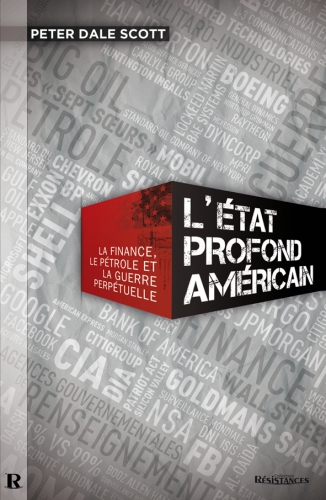 Docteur en sciences politiques et ancien diplomate, le Canadien Peter Dale SCOTT est l’auteur de nombreux ouvrages (dont
Docteur en sciences politiques et ancien diplomate, le Canadien Peter Dale SCOTT est l’auteur de nombreux ouvrages (dont 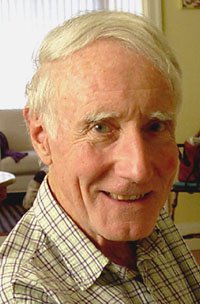 L’État profond constitue aujourd’hui un système quasi institutionnalisé dans des agences (comme la CIA et la NSA) qui échappent au contrôle démocratique. Mais il ne se limite pas à ces services secrets, et l’auteur décrit notamment l’influence excessive d’entreprises privées telles que Booz Allen Hamilton (l’ex-employeur d’Edward Snowden) et la SAIC, 70 % des budgets du Renseignement aux États-Unis étant aujourd’hui sous-traités.
L’État profond constitue aujourd’hui un système quasi institutionnalisé dans des agences (comme la CIA et la NSA) qui échappent au contrôle démocratique. Mais il ne se limite pas à ces services secrets, et l’auteur décrit notamment l’influence excessive d’entreprises privées telles que Booz Allen Hamilton (l’ex-employeur d’Edward Snowden) et la SAIC, 70 % des budgets du Renseignement aux États-Unis étant aujourd’hui sous-traités.
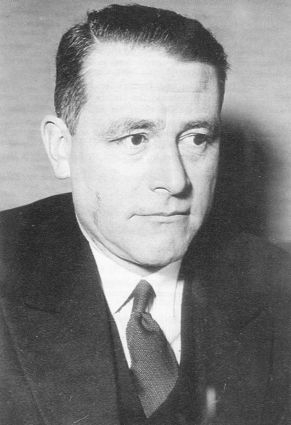 OVER THE past few years, the conviction that the end of the Cold War inaugurated an era of great-power peace to accompany the inevitable spread of democratic capitalism has been shattered. In Georgia and Ukraine, thousands have died as Washington’s attempt to fence in Russia with NATO allies and affiliates has been answered by Moscow’s determination to rebuild a Eurasian sphere of influence. In East Asia, China’s growing assertiveness has alarmed its neighbors and collided with America’s determination to remain the dominant power in the region. Regime-change efforts sponsored by the United States and its allies in Iraq, Libya and Syria have created power vacuums and bloody regional proxy wars, to the benefit of Al Qaeda and the Islamic State.
OVER THE past few years, the conviction that the end of the Cold War inaugurated an era of great-power peace to accompany the inevitable spread of democratic capitalism has been shattered. In Georgia and Ukraine, thousands have died as Washington’s attempt to fence in Russia with NATO allies and affiliates has been answered by Moscow’s determination to rebuild a Eurasian sphere of influence. In East Asia, China’s growing assertiveness has alarmed its neighbors and collided with America’s determination to remain the dominant power in the region. Regime-change efforts sponsored by the United States and its allies in Iraq, Libya and Syria have created power vacuums and bloody regional proxy wars, to the benefit of Al Qaeda and the Islamic State.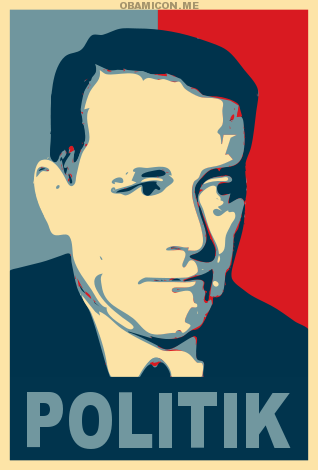 An alternative approach, the so-called Central European approach, favors redrawing arbitrary political boundaries to create more homogeneous ethnic or linguistic groups. Neither doctrine is inherently illiberal. In his Representative Government, John Stuart Mill thus argued that liberal, representative government is most likely to succeed in countries in which most of the citizens share at least a common language, a thesis that the continuing disintegration of multiethnic states in our time would appear to confirm. In Mill’s words, “Free institutions are next to impossible in a country made up of different nationalities. Among a people without fellow-feeling, especially if they read and speak different languages, the united public opinion, necessary to the working of representative government, cannot exist.” Neither approach to defining the citizens of sovereign states equates political independence of one community from another with inherent and unremitting enmity.
An alternative approach, the so-called Central European approach, favors redrawing arbitrary political boundaries to create more homogeneous ethnic or linguistic groups. Neither doctrine is inherently illiberal. In his Representative Government, John Stuart Mill thus argued that liberal, representative government is most likely to succeed in countries in which most of the citizens share at least a common language, a thesis that the continuing disintegration of multiethnic states in our time would appear to confirm. In Mill’s words, “Free institutions are next to impossible in a country made up of different nationalities. Among a people without fellow-feeling, especially if they read and speak different languages, the united public opinion, necessary to the working of representative government, cannot exist.” Neither approach to defining the citizens of sovereign states equates political independence of one community from another with inherent and unremitting enmity.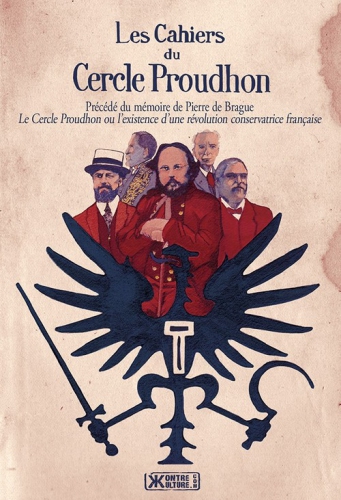

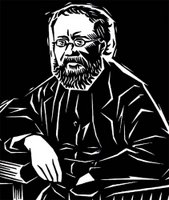 Si l’on s’en tient aux théories, Proudhon, par son fédéralisme, son mutualisme, sa critique acide de la démocratie et de la propriété capitaliste, ainsi que son caractère de farouche pourfendeur de la culture bourgeoise, a su permettre –malgré les tentatives de récupération des socialistes républicains- « à des Français, qui se croyaient ennemis jurés, de s’unir pour travailler de concert à l’organisation du pays français ». Nous touchons là un point essentiel : Proudhon était un homme d’ordre et non cet anti-étatiste anti-théiste et anti-propriétaire primaire que l’on veut nous faire accroire… C’est en tant que prophète de « l’ordre social français » que les membres du Cercle célèbrent ce « grand réaliste », ce « Maître de la contre-révolution », ce « Proudhon constructeur » à l’esprit et à la foi révolutionnaire. J’arrête ici, c’est certainement déjà trop de dialectique pour les quelques placides intellectuels de « gôche » qui prétendent s’accaparer la figure de ce rude fils de paysan, viril et guerrier, inaltérable et hardi défenseur du Travail, de la Famille et de la Terre (qui a dit Patrie ?) ; je ne voudrai pas être désigné responsable de l’ataraxie mentale dont ils souffrent, si peu nombreux soient-ils.
Si l’on s’en tient aux théories, Proudhon, par son fédéralisme, son mutualisme, sa critique acide de la démocratie et de la propriété capitaliste, ainsi que son caractère de farouche pourfendeur de la culture bourgeoise, a su permettre –malgré les tentatives de récupération des socialistes républicains- « à des Français, qui se croyaient ennemis jurés, de s’unir pour travailler de concert à l’organisation du pays français ». Nous touchons là un point essentiel : Proudhon était un homme d’ordre et non cet anti-étatiste anti-théiste et anti-propriétaire primaire que l’on veut nous faire accroire… C’est en tant que prophète de « l’ordre social français » que les membres du Cercle célèbrent ce « grand réaliste », ce « Maître de la contre-révolution », ce « Proudhon constructeur » à l’esprit et à la foi révolutionnaire. J’arrête ici, c’est certainement déjà trop de dialectique pour les quelques placides intellectuels de « gôche » qui prétendent s’accaparer la figure de ce rude fils de paysan, viril et guerrier, inaltérable et hardi défenseur du Travail, de la Famille et de la Terre (qui a dit Patrie ?) ; je ne voudrai pas être désigné responsable de l’ataraxie mentale dont ils souffrent, si peu nombreux soient-ils.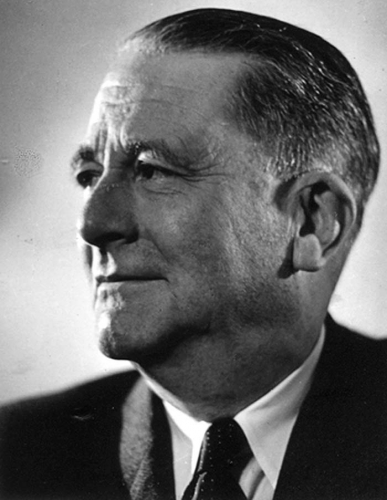






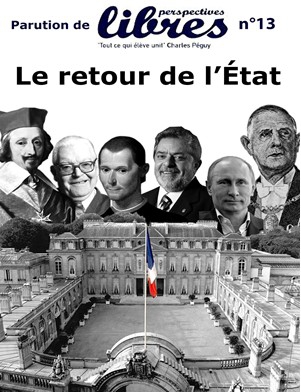
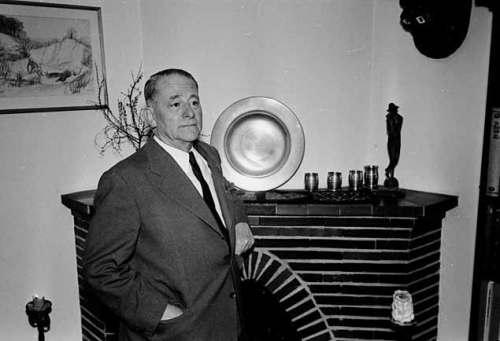
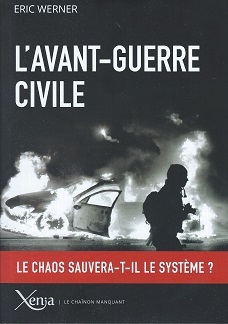 Il y a dix-sept ans paraissait à L'Âge d'Homme, L'avant-guerre civile, d'Eric Werner. La réédition,
Il y a dix-sept ans paraissait à L'Âge d'Homme, L'avant-guerre civile, d'Eric Werner. La réédition,  L'Etat se délite et, dans le même temps, il se refait en menant une guerre intra-étatique, indirectement, contre ses propres citoyens. Il s'agit de les contrôler, de les espionner, de restreindre leur liberté d'opinion, d'expression et de recherche. Il s'agit de leur inoculer une pensée unique par la désinformation et la propagande. Il s'agit de les disloquer en s'en prenant à tout ce qui naturellement leur permettrait de s'opposer au pouvoir total que l'Etat exerce de plus en plus sur eux.
L'Etat se délite et, dans le même temps, il se refait en menant une guerre intra-étatique, indirectement, contre ses propres citoyens. Il s'agit de les contrôler, de les espionner, de restreindre leur liberté d'opinion, d'expression et de recherche. Il s'agit de leur inoculer une pensée unique par la désinformation et la propagande. Il s'agit de les disloquer en s'en prenant à tout ce qui naturellement leur permettrait de s'opposer au pouvoir total que l'Etat exerce de plus en plus sur eux.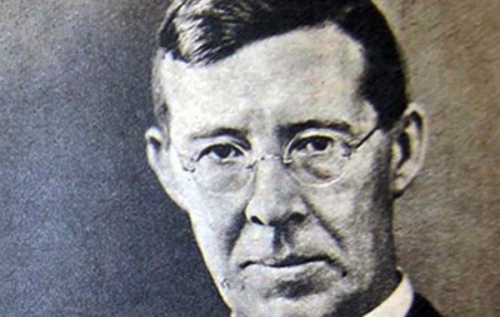
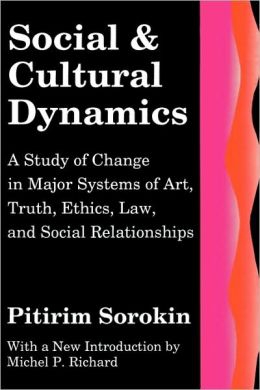 Pitirim Alexandrovich Sorokin (1889–1968) was born in Russia to a Russian father and an indigenous (Komi, an ethnic group related to Finns) mother. Like other intellectuals of his age, he was swept up in the revolt against the tsarist government. He held a cabinet post in the short-lived Russian Provisional Government (1917), and had the distinction of being imprisoned successively by both tsarist and Bolshevist factions. Eventually sentenced to death, he was pardoned by Lenin, emigrated, and came to the US. There he enjoyed a long and distinguished academic career, much of it at Harvard University, where he served as head of the sociology department.
Pitirim Alexandrovich Sorokin (1889–1968) was born in Russia to a Russian father and an indigenous (Komi, an ethnic group related to Finns) mother. Like other intellectuals of his age, he was swept up in the revolt against the tsarist government. He held a cabinet post in the short-lived Russian Provisional Government (1917), and had the distinction of being imprisoned successively by both tsarist and Bolshevist factions. Eventually sentenced to death, he was pardoned by Lenin, emigrated, and came to the US. There he enjoyed a long and distinguished academic career, much of it at Harvard University, where he served as head of the sociology department.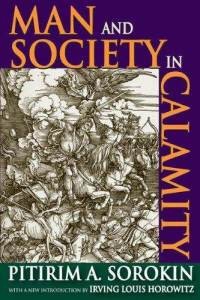 Sorokin was especially interested in the process by which societies change cultural orientations. He opposed the view, held by communists, that social change must be imposed externally, such as by a revolution. His principle of imminent change states that external forces are not necessary: societies change because it is in their nature to change. Although sensate or ideational tendencies may dominate at any given time, every culture contains both mentalities in a tension of opposites. When one mentality becomes stretched too far, it sets in motion compensatory transformative forces.
Sorokin was especially interested in the process by which societies change cultural orientations. He opposed the view, held by communists, that social change must be imposed externally, such as by a revolution. His principle of imminent change states that external forces are not necessary: societies change because it is in their nature to change. Although sensate or ideational tendencies may dominate at any given time, every culture contains both mentalities in a tension of opposites. When one mentality becomes stretched too far, it sets in motion compensatory transformative forces.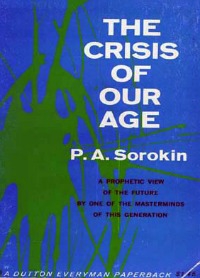 While the preceding might suggest that Sorokin was a cheerless prophet of doom, that is not so, and his later work decidedly emphasized the positive. He founded the Harvard Research Center for Creative Altruism, which sought to understand the role of love and altruism in producing a better society. Much of the Center’s research was summarized in Sorokin’s second masterpiece, The Ways and the Power of Love.
While the preceding might suggest that Sorokin was a cheerless prophet of doom, that is not so, and his later work decidedly emphasized the positive. He founded the Harvard Research Center for Creative Altruism, which sought to understand the role of love and altruism in producing a better society. Much of the Center’s research was summarized in Sorokin’s second masterpiece, The Ways and the Power of Love.
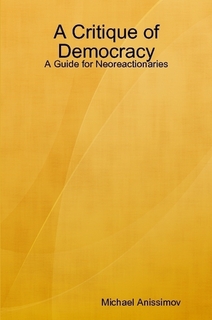
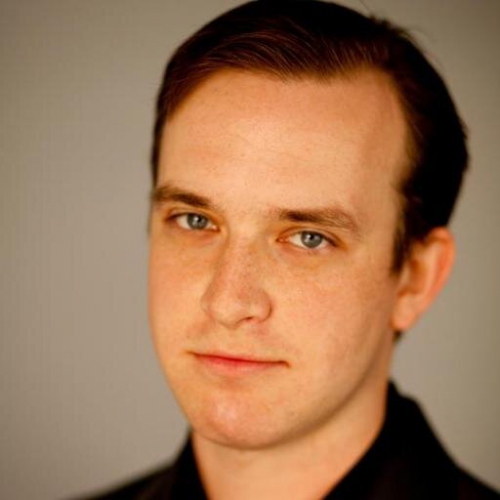
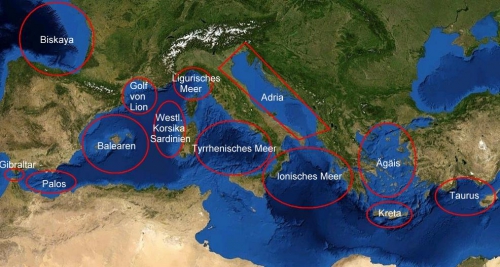
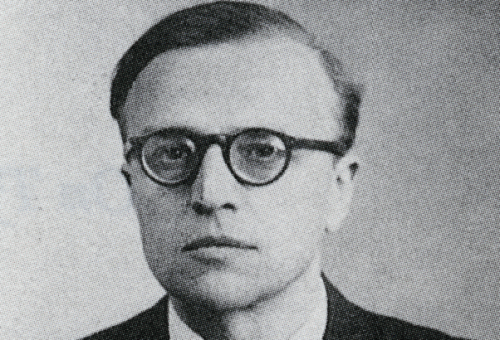

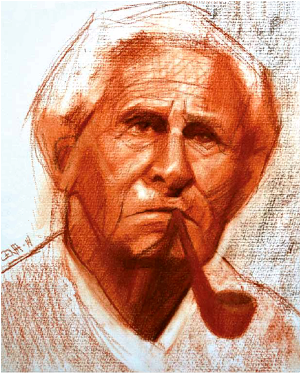
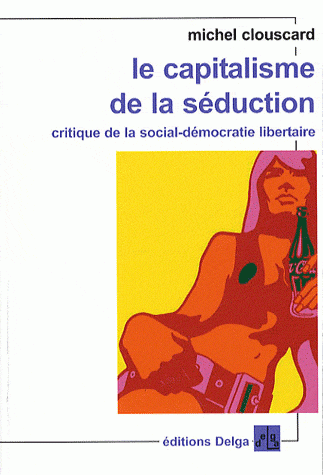 Fu Michel Clouscard, negli anni Settanta, a sanare l’errore del francofortese, mettendo sugli attenti, tra le pagine dell’Humanité – quando ancora quel giornale valeva qualcosa – i militanti del PCF: vige una gerarchia di accesso al consumo, perché i beni non si equivalgono. La lavatrice, il frigorifero, l’automobile sono beni di equipaggiamento, dediti a riprodurre la forza lavoro dell’operaio. Così come oggi lo sono l’Iphone, il computer, il nuovo tablet, strumenti che da un lato rinnovano e dall’altro si rendono funzionali al lavoro dell’impiegato. Ma né l’operaio né l’impiegato hanno intenzione di consumare, o almeno non consumano gli oggetti in modo libidinale o ludico. Con ciò, il nostro presente ci obbliga a scrostare questi sedimenti marcusiani per farci confrontare con la realtà: il diverso grado che la società riserva agli individui di consumare senza produrre. Questa scala è recentemente resa pubblica sui social network. Tramite il mondo dei social la struttura verticale e gerarchica di accesso al consumo sembra ristabilirsi svelando l’ipocrita velo di maya che per un trentennio ha illuso chi sperava nella società dell’uguaglianza. Il definitivo collasso della riservatezza puritana, dell’influenza cattolica sulle giovani generazioni, mostrano che la civiltà dei consumi (esente dalla produzione) è una verità per una percentuale bassissima della popolazione, cui è permesso il rito che Clouscard chiama “potlach del plus valore”: lo spreco di valore aggiunto prodotto da altri. Il fenomeno dei Rich Kids su Instagram non è che uno svelamento. Da Beverly Hills fino a Mosca l’ostentazione è una moda anche per le élites dell’ex nomenklatura sovietica che dopo 70 anni di Unione hanno liberalizzato lo champagne e le prostitute oltre le quattro mura domestiche e fuori dai vetri oscurati delle Zil. Ovunque – persino a Teheran, prima che, in nome della decenza comune, il link fu bloccato – i figli delle élites promuovono sfacciatamente la vita lussuosa e lo sperpero di denaro.
Fu Michel Clouscard, negli anni Settanta, a sanare l’errore del francofortese, mettendo sugli attenti, tra le pagine dell’Humanité – quando ancora quel giornale valeva qualcosa – i militanti del PCF: vige una gerarchia di accesso al consumo, perché i beni non si equivalgono. La lavatrice, il frigorifero, l’automobile sono beni di equipaggiamento, dediti a riprodurre la forza lavoro dell’operaio. Così come oggi lo sono l’Iphone, il computer, il nuovo tablet, strumenti che da un lato rinnovano e dall’altro si rendono funzionali al lavoro dell’impiegato. Ma né l’operaio né l’impiegato hanno intenzione di consumare, o almeno non consumano gli oggetti in modo libidinale o ludico. Con ciò, il nostro presente ci obbliga a scrostare questi sedimenti marcusiani per farci confrontare con la realtà: il diverso grado che la società riserva agli individui di consumare senza produrre. Questa scala è recentemente resa pubblica sui social network. Tramite il mondo dei social la struttura verticale e gerarchica di accesso al consumo sembra ristabilirsi svelando l’ipocrita velo di maya che per un trentennio ha illuso chi sperava nella società dell’uguaglianza. Il definitivo collasso della riservatezza puritana, dell’influenza cattolica sulle giovani generazioni, mostrano che la civiltà dei consumi (esente dalla produzione) è una verità per una percentuale bassissima della popolazione, cui è permesso il rito che Clouscard chiama “potlach del plus valore”: lo spreco di valore aggiunto prodotto da altri. Il fenomeno dei Rich Kids su Instagram non è che uno svelamento. Da Beverly Hills fino a Mosca l’ostentazione è una moda anche per le élites dell’ex nomenklatura sovietica che dopo 70 anni di Unione hanno liberalizzato lo champagne e le prostitute oltre le quattro mura domestiche e fuori dai vetri oscurati delle Zil. Ovunque – persino a Teheran, prima che, in nome della decenza comune, il link fu bloccato – i figli delle élites promuovono sfacciatamente la vita lussuosa e lo sperpero di denaro.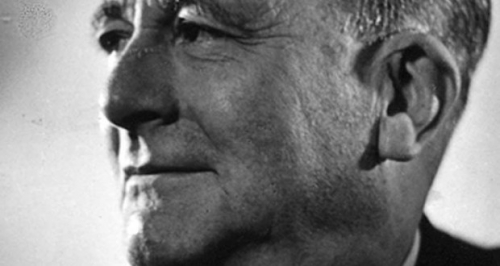
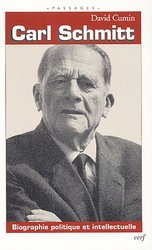 PHILITT :
PHILITT :  David Cumin : Absolument, Le Nomos de la terre et L’Évolution vers un concept discriminatoire de guerre restent deux ouvrages tout à fait incontournables. Le Nomos de la terre est absolument fondamental en droit international, en droit de la guerre. De même que la théorie du partisan, qui pourrait être améliorée, amendée, actualisée, mais demeure incontournable. On peut d’ailleurs regretter que ce ne soit que très récemment que les spécialistes français en droit international se soient intéressés à Schmitt. Pourtant il y a toujours eu chez lui ces deux piliers : droit constitutionnel et droit international. Par exemple, ses écrits sur la Société des Nations sont tout à fait transposables à l’ONU et donc tout à fait d’actualité.
David Cumin : Absolument, Le Nomos de la terre et L’Évolution vers un concept discriminatoire de guerre restent deux ouvrages tout à fait incontournables. Le Nomos de la terre est absolument fondamental en droit international, en droit de la guerre. De même que la théorie du partisan, qui pourrait être améliorée, amendée, actualisée, mais demeure incontournable. On peut d’ailleurs regretter que ce ne soit que très récemment que les spécialistes français en droit international se soient intéressés à Schmitt. Pourtant il y a toujours eu chez lui ces deux piliers : droit constitutionnel et droit international. Par exemple, ses écrits sur la Société des Nations sont tout à fait transposables à l’ONU et donc tout à fait d’actualité.